#which is the whole reason i wanted to be on this site less in the first place but i was on such a good streak of not seeing it
Explore tagged Tumblr posts
Text
On Tumblr it's pretty common to follow people based on the fact that they're good at curating (ie. you like the things they reblog) as opposed to following the OP of every post you like immediately, because despite the ravaging discoverability on this site has taken, especially on the fandom side, there still are people on here who run fully curatorial blogs and like doing the digging it takes to find the "good posts".
In fact, I feel like the historical presence of both themed and unthemed curatorial blogs on this site is probably the reason it's so reliant on reblogs, and the weakening of their ability to find things is one of the big reasons why posts lose momentum faster now. (The other reason people reblog less is because of the damage a culture of harassment caused to this site's identity, but that's out of scope for this conversation.) It used to be that if a big fandom blog reblogged you, you didn't have to worry about your post getting buried, because their followers and peer network would give you exponentially more notes.
Which isn't to say that you shouldn't follow the OPs of posts you like, but it's often not the most efficient or even the most interesting way to get a dashboard full of interesting things. And if you do want to follow OPs directly, you could be the next highly curatorial blog that gets followed because people like your ability to find the "good posts" and be the one with the "good commentary".
The critical thing here is that follower count isn't actually something that is visible to anyone but yourself, so that's still not exactly "popularity". However, popularity on this site gets you basically nothing other than an inbox you can never empty fully and probably a snide hatedom from people who resent having to see your URL because blocking someone doesn't hide their additions in the threads, and you can't filter out the additions of specific people without hiding the whole thread.
Reblogging is essentially a conversation tool, and has multiple registers. All the "rules" you might hear about when it's okay to add commentary and when you should keep your commentary to the tags are derived from the old way the site used to display your activity. People who have been here for a long time expect certain "manners", even when most of them have forgotten or never knew what the origin of those manners was, but I think because tags and comments are now so embedded into the OP's experience of their own posts, people forget that the middle layer of commentary and curation is what made this site what it was.
So, in my opinion the best way to think about reblogging is not as you talking to the OP -- it's you talking to people who follow you, with the OP just having provided the conversation starter.
People keep telling newcomers that they must reblog posts here because that's the only way to boost a post. And while that isn't not true, it also wildly misrepresents the reblogging culture that Tumblr actually has.
The posts like that keep talking about things as if the OP ("content creator") is someone who needs eyeballs on their work and the rest of us peons ("consumers") owe them the number-go-up an algorithm handles on other sites.
Nothing could be farther from the truth.
Tumblr isn't a popularity contest (note how you can't see follower count), and it's not structured with creators at the top and audience at the bottom. It's egalitarian, we're all in the same crowd, and yes, some of us have 2 followers and some have twenty bazillion, but no one actually knows which is which.
You reblog a post not as a favour to the glorious yet suffering content mill, but because you want people who look at your blog (all two of them now, all twenty of them once more people look at the notes on the posts you reblog) to see that post in the context of your blog.
Your blog is your space, and you're meant fill it with things that you want seen there. That can be your original posts, reblogs with commentary, or just a collection of things you think are neat.
Reblogs chains are often how people find other people to follow, too. So reblog to show off a post that you like and to attract more people who like the things you like to show off. It's that simple. And it's about you.
And because everyone does this, reblogs posts they want to be seen on their own blog, when people make posts that a lot of other people enjoy, that post blows up and is seen by even more people.
Tumblr's reblog system is a network of people picking something up and going "look at this cool thing I found!". It is not a service to content creators.
#Like#We're long past when you could run a “critique” or bashing blog on this site without people being like “dude what the hell?”#because everything we do is now visible by default to the OP#(btw it doesn't have to be -- if you want a more old-school Tumblr experience you can turn tag view off)#(and frankly if you're newly popular on this site I recommend doing that)#Like I'm not gonna say the culture of this site has always been nice#in fact there are a lot of people who made their bread by reblogging posts and leaving nasty commentary on them#as a way to perform to *their* audience#but because that would be one note to the OP#and the rest of them would be tags commenting on the contrary commentary#it would be easier to ignore#My policy of “don't reblog posts where the OP is a dipshit and the only value is in the commentary” is from that time#and it's still serving me well#you cannot think about the notes of a post like the “likes” of a post on Instagram or something#they're also the comment section and as we all know#all comment sections on the internet suck ass always#Also not for nothing I wanna make note that art reposting has always been a thing on this site#Like. Oh my god you don't know how bad it used to be#it's still pretty bad but it's gotten a lot better#and so blogs that curate art from *other sites* on the internet for Tumblr are comparable to the middle layer curatorial rebloggers#just. Worse#because they're not exposing you to new blogs on this site#tbh having a dash where you see the same picture three or four times in a row used to be a “healthy” dash#but I think with people following the OPs directly that's gotten less common#and among other things that's contributing to the constantly plummeting note counts on art and meta.
95 notes
·
View notes
Text
having like. objectively a godawful shitty fucking no good very bad day can u guys send asks
#absolutely everything is falling apart at work today#and while im trying to keep the place from catching fire stuff in my regular life starts blowing up too#and long story short im fuckin. out $50 now bc of shit i couldnt control#and im on my period. and i dont have pads bc why am i still getting my period on t for the love of GOD#and i have a stupid. obligation i agreed to w my parents tomorrow that i totally forgot abt until now#but after today i just wanna go home and pass out for 48 hours straight its the only way ill recover from today#and also a lot of weed but thats neither here nor there#not to mention the one moment i have to check my socials i go on tumblr and see ppl falling for and agreeing w thinly veiled transphobia#which is the whole reason i wanted to be on this site less in the first place but i was on such a good streak of not seeing it#and the one day im already in a bad mood. god#i know its rich complaining abt tumblr on tumblr lol but. listen man whatever lmao#my point is i desperately need to be distracted rn bc im just . thru the roof stressed and pissed off rn#juno.txt
3 notes
·
View notes
Text

SO HERE IS THE WHOLE STORY (SO FAR).
I am on my knees begging you to reblog this post and to stop reblogging the original ones I sent out yesterday. This is the complete account with all the most recent info; the other one is just sending people down senselessly panicked avenues that no longer lead anywhere.
IN SHORT
Cliff Weitzman, CEO of Speechify and (aspiring?) voice actor, used AI to scrape thousands of popular, finished works off AO3 to list them on his own for-profit website and in his attached app. He did this without getting any kind of permission from the authors of said work or informing AO3. Obviously.
When fandom at large was made aware of his theft and started pushing back, Weitzman issued a non-apology on the original social media posts—using
his dyslexia;
his intent to implement a tip-system for the plagiarized authors; and
a sudden willingness to take down the work of every author who saw my original social media posts and emailed him individually with a ‘valid’ claim,
as reasons we should allow him to continue monetizing fanwork for his own financial gain.
When we less-than-kindly refused, he took down his ‘apologies’ as well as his website (allegedly—it’s possible that our complaints to his web host, the deluge of emails he received or the unanticipated traffic brought it down, since there wasn’t any sort of official statement made about it), and when it came back up several hours later, all of the work formerly listed in the fan fiction category was no longer there.
THE TAKEAWAYS
1. Cliff Weitzman (aka Ofek Weitzman) is a scumbag with no qualms about taking fanwork without permission, feeding it to AI and monetizing it for his own financial gain;
2. Fandom can really get things done when it wants to, and
3. Our fanworks appear to be hidden, but they’re NOT DELETED from Weitzman’s servers, and independently published, original works are still listed without the authors' permission. We need to hold this man responsible for his theft, keep an eye on both his current and future endeavors, and take action immediately when he crosses the line again.
THE TIMELINE, THE DETAILS, THE SCREENSHOTS (behind the cut)
Sunday night, December 22nd 2024, I noticed an influx in visitors to my fic You & Me & Holiday Wine. When I searched the title online, hoping to find out where they came from, a new listing popped up (third one down, no less):

This listing is still up today, by the way, though now when you follow the link to word-stream, it just brings you to the main site. (Also, to be clear, this was not the cause for the influx of traffic to my fic; word-stream did not link back to the original work anywhere.)
I followed the link to word-stream, where to my horror Y&M&HW was listed in its entirety—though, beyond the first half of the first chapter, behind a paywall—along with a link promising to take me—through an app downloadable on the Apple Store—to an AI-narrated audiobook version. When I searched word-stream itself for my ao3 handle I found both of my multi-chapter fics were listed this way:
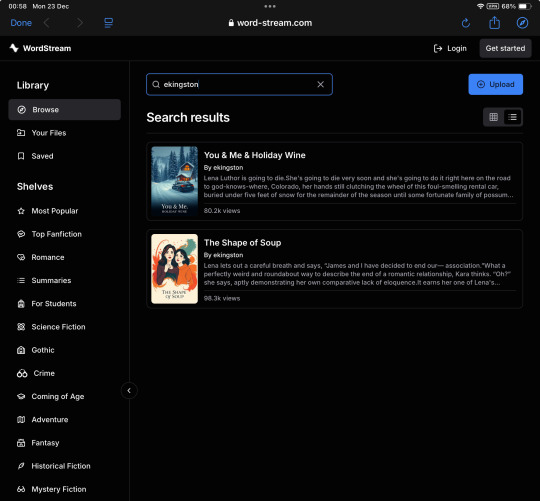
Because the tags on my fics (which included genres* and characters, but never the original IPs**) weren’t working, I put ‘Kara Danvers’ into the search bar and discovered that many more supercorp fics (Supergirl TV fandom, Kara Danvers/Lena Luthor pairing) were listed.
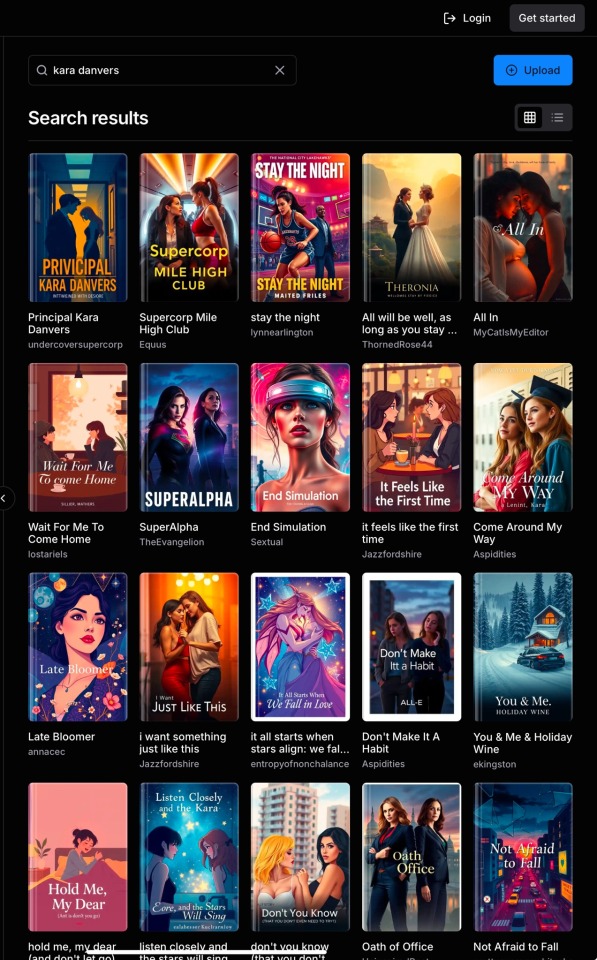
I went looking online for any mention of word-stream and AI plagiarism (the covers—as well as the ridiculously inflated number of reviews and ratings—made it immediately obvious that AI fuckery was involved), but found almost nothing: only one single Reddit post had been made, and it received (at that time) only a handful of upvotes and no advice.
I decided to make a tumblr post to bring the supercorp fandom up to speed about the theft. I draw as well as write for fandom and I’ve only ever had to deal with art theft—which has a clear set of steps to take depending on where said art was reposted—and I was at a loss regarding where to start in this situation.
After my post went up I remembered Project Copy Knight, which is worth commending for the work they’ve done to get fic stolen from AO3 taken down from monetized AI 'audiobook’ YouTube accounts. I reached out to @echoekhi, asking if they’d heard of this site and whether they could advise me on how to get our works taken down.

While waiting for a reply I looked into Copy Knight’s methods and decided to contact OTW’s legal department:
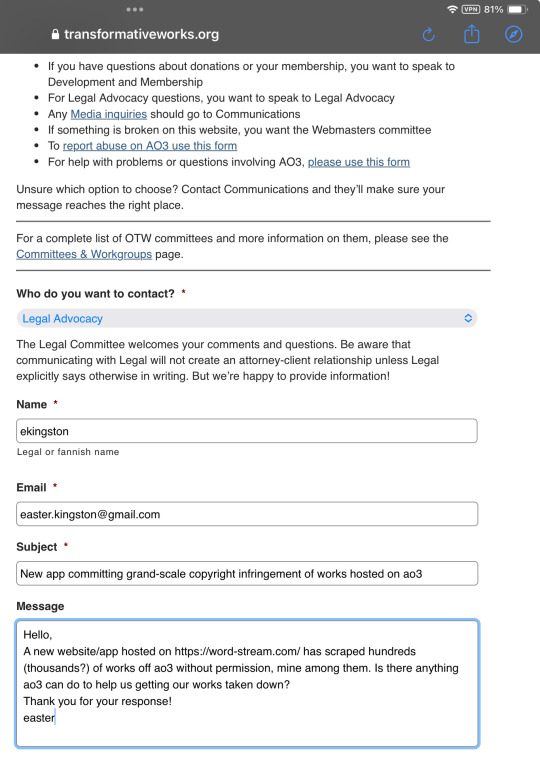
And then I went to bed.
By morning, tumblr friends @makicarn and @fazedlight as well as a very helpful tumblr anon had seen my post and done some very productive sleuthing:
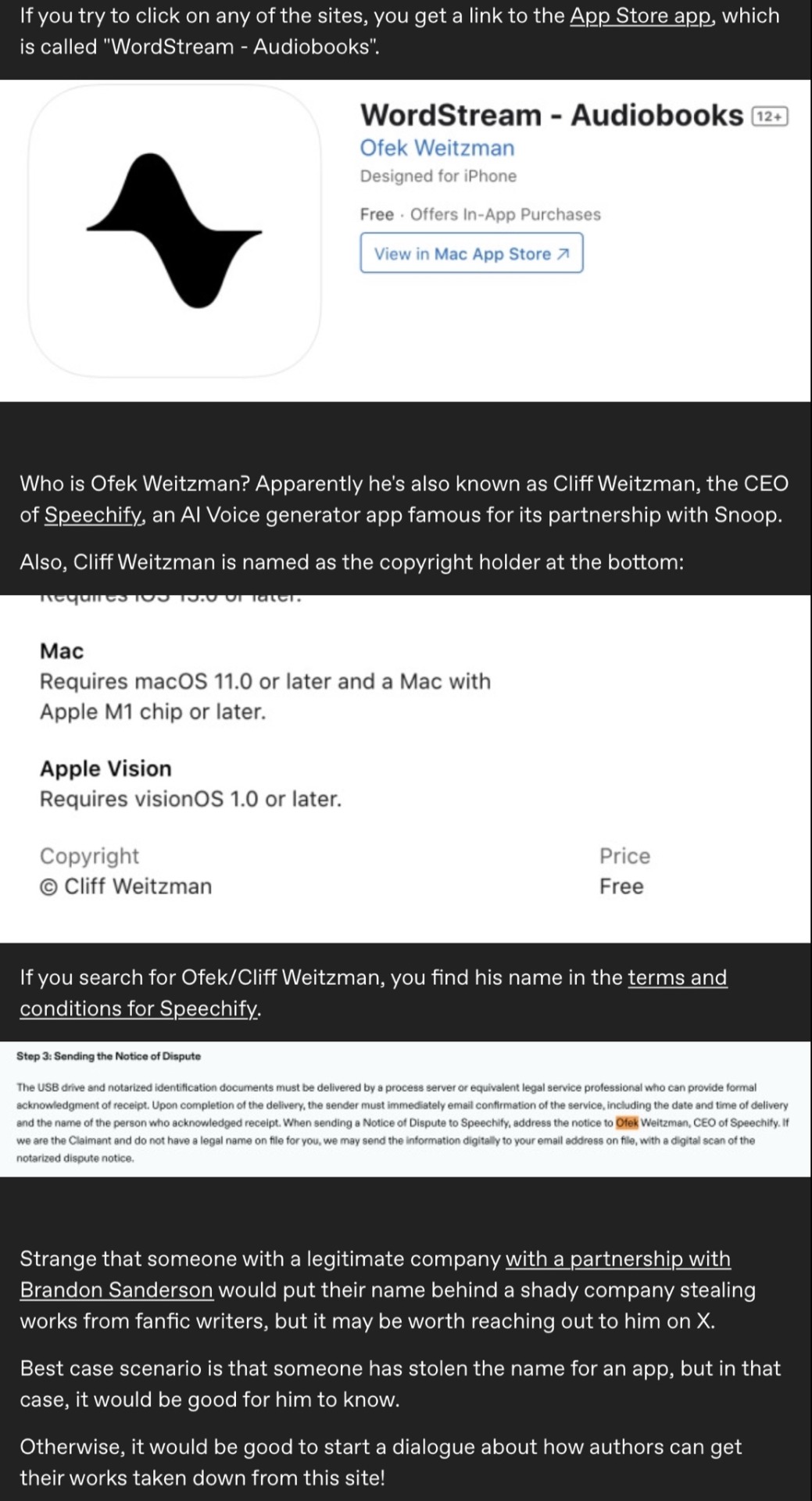
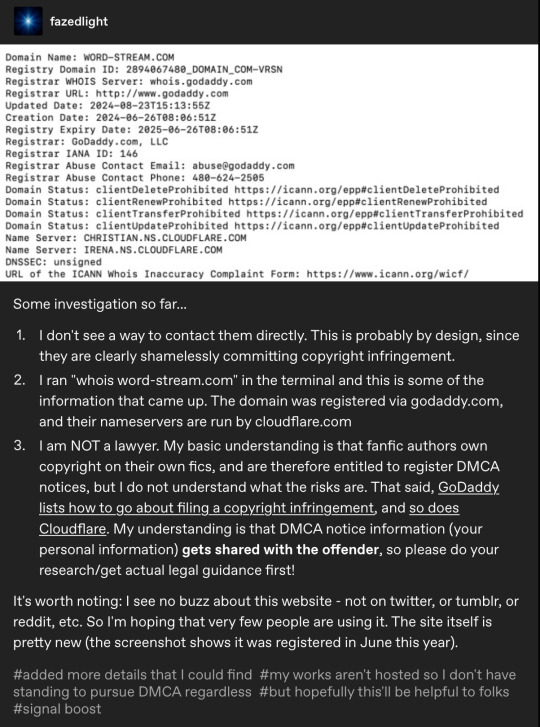
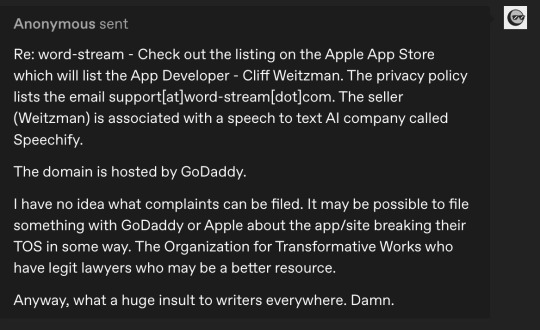
@echoekhi had also gotten back to me, advising me, as expected, to contact the OTW. So I decided to sit tight until I got a response from them.
That response came only an hour or so later:
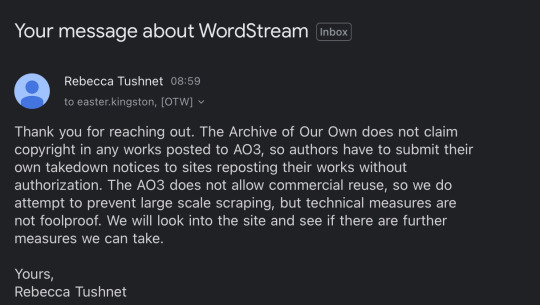
Which was 100% understandable, but still disappointing—I doubted a handful of individual takedown requests would accomplish much, and I wasn’t eager to share my given name and personal information with Cliff Weitzman himself, which is unavoidable if you want to file a DMCA.
I decided to take it to Reddit, hoping it would gain traction in the wider fanfic community, considering so many fandoms were affected. My Reddit posts (with the updates at the bottom as they were emerging) can be found here and here.
A helpful Reddit user posted a guide on how users could go about filing a DMCA against word-stream here (to wobbly-at-best results)
A different helpful Reddit user signed up to access insight into word-streams pricing. Comment is here.
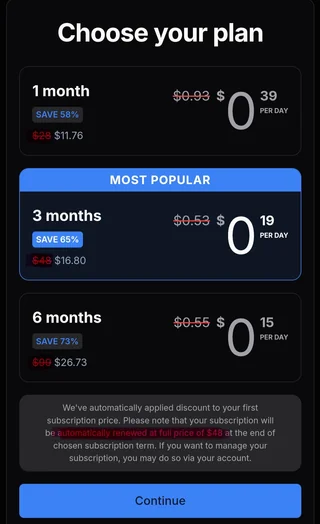
Smells unbelievably scammy, right? In addition to those audacious prices—though in all fairness any amount of money would be audacious considering every work listed is accessible elsewhere for free—my dyscalculia is screaming silently at the sight of that completely unnecessary amount of intentionally obscured numbers.
Speaking of which! As soon as the post on r/AO3—and, as a result, my original tumblr post—began taking off properly, sometime around 1 pm, jumpscare! A notification that a tumblr account named @cliffweitzman had commented on my post, and I got a bit mad about the gist of his message :
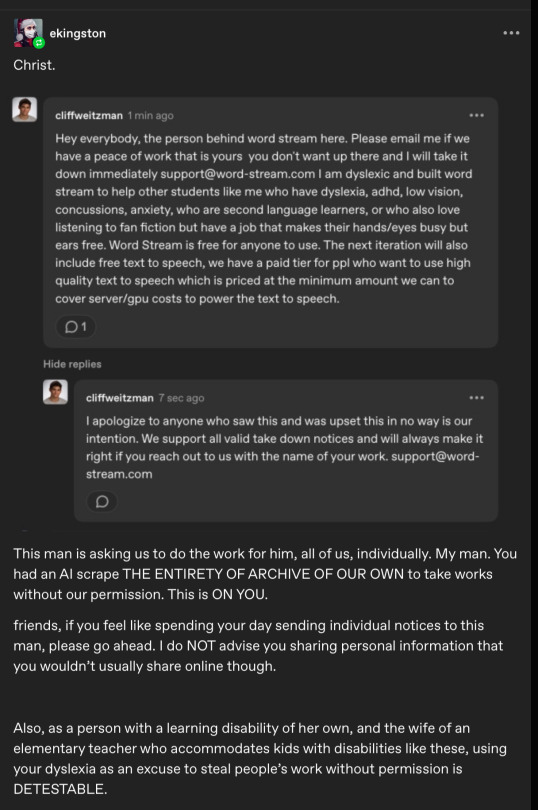
Fortunately he caught plenty of flack in the comments from other users (truly you should check out the comment section, it is extremely gratifying and people are making tremendously good points), in response to which, of course, he first tried to both reiterate and renegotiate his point in a second, longer comment (which I didn’t screenshot in time so I’m sorry for the crappy notification email formatting):
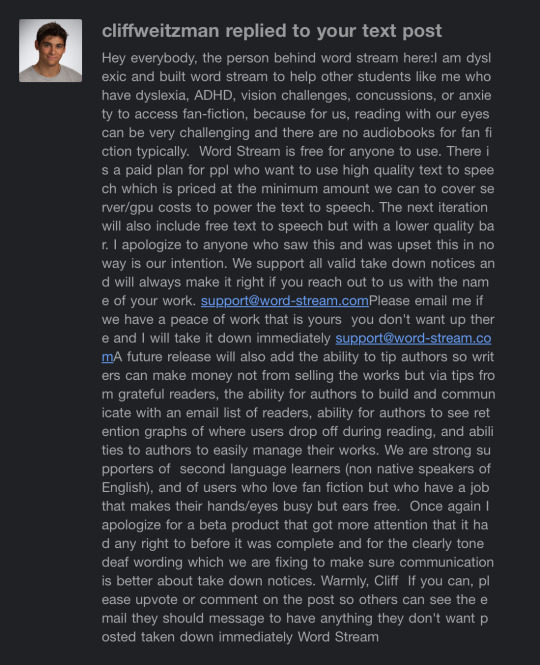
which he then proceeded to also post to Reddit (this is another Reddit user’s screenshot, I didn’t see it at all, the notifications were moving too fast for me to follow by then)
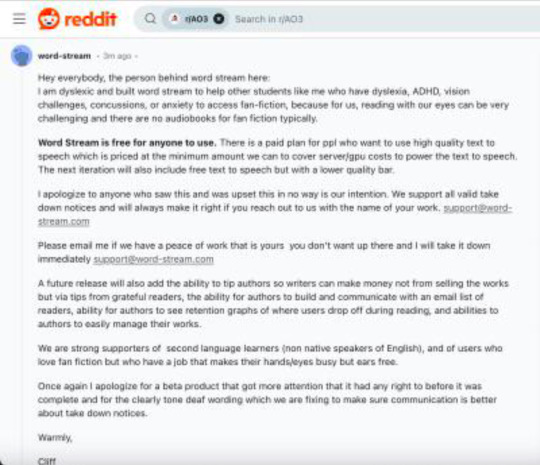
... where he got a roughly equal amount of righteously furious replies. (Check downthread, they're still there, all the way at the bottom.)
After which Cliff went ahead & deleted his messages altogether.
It’s not entirely clear whether his account was suspended by Reddit soon after or whether he deleted it himself, but considering his tumblr account is still intact, I assume it’s the former. He made a handful of sock puppet accounts to play around with for a while, both on Reddit and Tumblr, only one of which I have a screenshot of, but since they all say roughly the same thing, you’re not missing much:
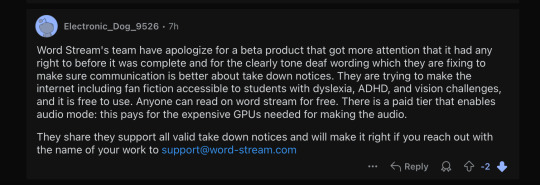
And then word-stream started throwing a DNS error.
That lasted for a good number of hours, which was unfortunately right around the time that a lot of authors first heard about the situation and started asking me individually how to find out whether their work was stolen too. I do not have that information and I am unclear on the perimeters Weitzman set for his AI scraper, so this is all conjecture: it LOOKS like the fics that were lifted had three things in common:
They were completed works;
They had over several thousand kudos on AO3; and
They were written by authors who had actively posted or updated work over the past year.
If anyone knows more about these perimeters or has info that counters my observation, please let me know!
I finally thought to check/alert evil Twitter during this time, and found out that the news was doing the rounds there already. I made a quick thread summarizing everything that had happened just in case. You can find it here.
I went to Bluesky too, where fandom was doing all the heavy lifting for me already, so I just reskeeted, as you do, and carried on.
Sometime in the very early evening, word-stream went back up—but the fan fiction category was nowhere to be seen. Tentative joy and celebration!***
That’s when several users—the ones who had signed up for accounts to gain intel and had accessed their own fics that way—reported that their work could still be accessed through their history. Relevant Reddit post here.
Sooo—
We’re obviously not done. The fanwork that was stolen by Weitzman may be inaccessible through his website right now, but they aren’t actually gone. And the fact that Weitzman wasn’t willing to get rid of them altogether means he still has plans for them.
This was my final edit on my Reddit post before turning off notifications, and it's pretty much where my head will be at for at least the foreseeable future:
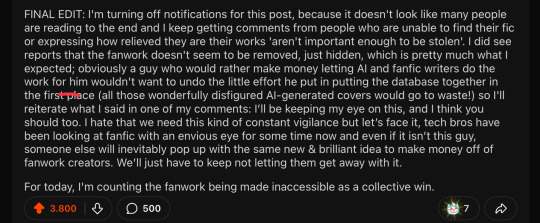
Please feel free to add info in the comments, make your own posts, take whatever action you want to take to protect your work. I only beg you—seriously, I’m on my knees here—to not give up like I saw a handful of people express the urge to do. Keep sharing your creative work and remain vigilant and stay active to make sure we can continue to do so freely. Visit your favorite fics, and the ones you’ve kept in your ‘marked for later’ lists but never made time to read, and leave kudos, leave comments, support your fandom creatives, celebrate podficcers and support AO3. We created this place and it’s our responsibility to keep it alive and thriving for as long as we possibly can.
Also FUCK generative AI. It has NO place in fandom spaces.
THE 'SMALL' PRINT (some of it in all caps):
*Weitzman knew what he was doing and can NOT claim ignorance. One, it’s pretty basic kindergarten stuff that you don’t steal some other kid’s art project and present it as your own only to act surprised when they protest and then tell the victim that they should have told you sooner that they didn’t want their project stolen. And two, he was very careful never to list the IPs these fanworks were based on, so it’s clear he was at least familiar enough with the legalities to not get himself in hot water with corporate lawyers. Fucking over fans, though, he figured he could get away with that.
**A note about the AI that Weitzman used to steal our work: it’s even greasier than it looks at first glance. It’s not just the method he used to lift works off AO3 and then regurgitate onto his own website and app. Looking beyond the untold horrors of his AI-generated cover ‘art’, in many cases these covers attempt to depict something from the fics in question that can’t be gleaned from their summaries alone. In addition, my fics (and I assume the others, as well) were listed with generated genres; tags that did not appear anywhere in or on my fic on AO3 and were sometimes scarily accurate and sometimes way off the mark. I remember You & Me & Holiday Wine had ‘found family’ (100% correct, but not tagged by me as such) and I believe The Shape of Soup was listed as, among others, ‘enemies to friends to lovers’ and ‘love triangle’ (both wildly inaccurate). Even worse, not all the fic listed (as authors on Reddit pointed out) came with their original summaries at all. Often the entire summary was AI-generated. All of these things make it very clear that it was an all-encompassing scrape—not only were our fics stolen, they were also fed word-for-word into the AI Weitzman used and then analyzed to suit Weitzman’s needs. This means our work was literally fed to this AI to basically do with whatever its other users want, including (one assumes) text generation.
***Fan fiction appears to have been made (largely) inaccessible on word-stream at this time, but I’m hearing from several authors that their original, independently published work, which is listed at places like Kindle Unlimited, DOES still appear in word-stream’s search engine. This obviously hurts writers, especially independent ones, who depend on these works for income and, as a rule, don’t have a huge budget or a legal team with oceans of time to fight these battles for them. If you consider yourself an author in the broader sense, beyond merely existing online as a fandom author, beyond concerns that your own work is immediately at risk, DO NOT STOP MAKING NOISE ABOUT THIS.
PLEASE check my later versions of this post via my main page to make sure you have the latest version of this post before you reblog. All the information I’ve been able to gather is in my reblogs below, and it's frustrating to see the old version getting passed around, sending people on wild goose chases.
Thank you all so much!
#fandom#plagiarism#AO3#speechify#word-stream#Cliff Weitzman#writers on tumblr#fan fic writing#AI plagiarism#independent authors#Ofek Weitzman#please share
46K notes
·
View notes
Text
Writing Tools for Planning Your Story
I've tried tons of writing apps and sites, so you don't have to. Here's a list of free sites to plot out your novel, with my review and some images of how I use it.
Milanote
Milanote is like having a giant pinboard with folders. You can upload anything onto it [yes even your main doc] and then draw over it or connect things with lines and arrows
Milanote lets you add up to a hundred things for free, not including drawing. This is one of the downsides of the site as I've found myself reaching that limit recently.
For me, the best part is being able to draw over stuff, and the color swatches.
Milanote is a lot less structured than other sites I've used, and personally, I don't think their templates are worth using.
8/10 overall, Milanote is what I mainly use. Here are some pics of how I use it:
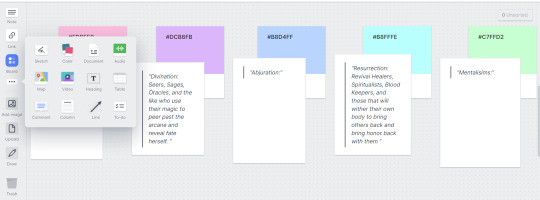
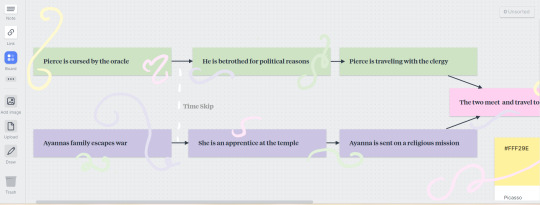
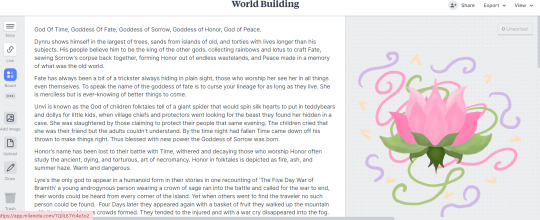
Miro
Miro is a flowchart website mainly used for corporate jobs, however, it can be a great plotting tool for that reason
Miro has a lot of great starter templates if you are looking for a more structured freeform experience. It also comes with a blank page as well.
Unfortunately, I'd argue that it's a bit of a hard tool for beginners to use without a template, I've learned copy-paste is my best friend with Miro the hard way.
It's much better than most platforms at making timelines though.
It has a limit of three boards which is a bit disappointing but overall, I think it's worth the try.
5/10 Miro is very middle of the road for me due to the limited ability to customize things and the free limit. Here are some pics:
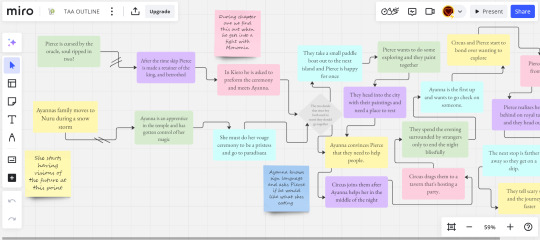
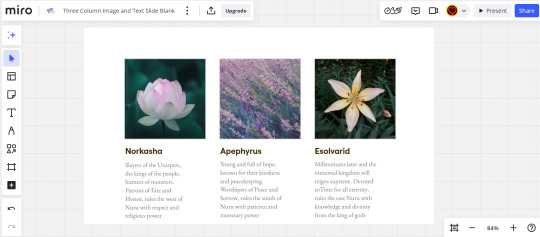
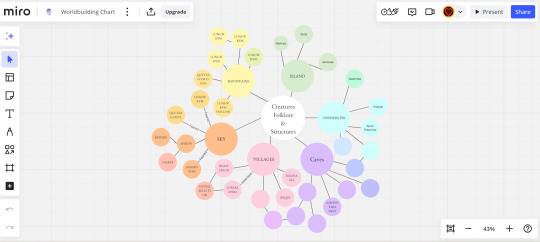
[I wrote that part weeks ago, I am now fully using Miro and believe it's the best for making timelines and charts, I just wish it let me make more boards 8/10]
Hiveword
This might be someone's jam, I can't really say it's mine though.
First off, the unpaid version is really just a few boxes saying "Write a summary here." which makes it just not worth it in my opinion
There really isn't any way to customise things which is my favorite part of most of these softwares
I've barely used this, so maybe there's something I'm missing but
1/10, Just use Google Docs at this point, here's a couple pics
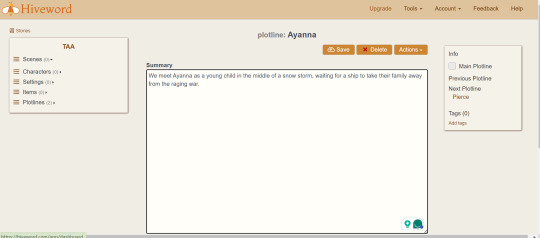

World Anvil
People like this software, it's mainly used for tabletop, which is just a different way of writing adventure, and I've seen it recommended by authors.
Unfortunately, I'm going to disagree with a lot of people and say it's hard to use and isn't even really good at plotting.
I may be biased on this one as every time I've tried to use it in the past I've struggled. However, it seems like another just write it in a document and create a folder.
I'd say it's closer to an organizing tool, but even then just use something else.
3/10, I have nothing to say about it but maybe you'll enjoy it, all here are two photos
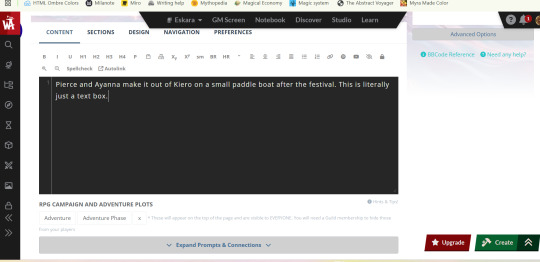

Campfire
This is the one I think I've heard the most about, but have never actually tried.
right off the bat, I'm going to say this is 100% worth it, you'll see at the end with the photos but this is like if Miro and World Anvil had an organization baby.
It's extremely easy to understand, and it makes timelines, it's more for writing your whole book but idk about that yet.
7/10, its themes are really pretty but it limits how much you can do to 20 I believe. Here are the photos
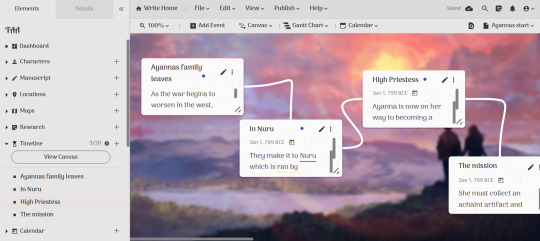
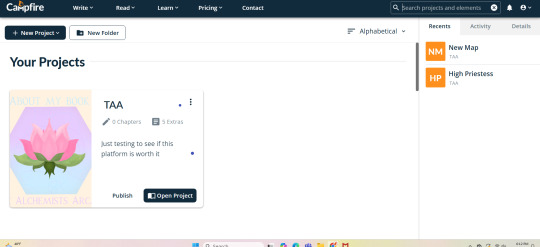
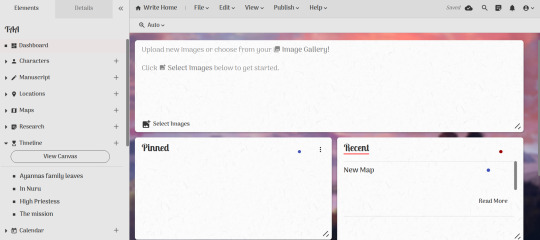
That's all for now, honestly, I think you should use Miro if you are looking to plot things out, and Milanote if you want to collect and organize your thoughts for writing, as that's what I do. Obviously what I like won't be for everyone, but hopefully, this helped you see some options
#writeblr#writers on tumblr#creative writing#worldbuilding#plotting#writing advice#writing tool#writing#writers#writing plans
1K notes
·
View notes
Note
Mr. Flanagan, I’d like to ask a question and I deeply hope that it does not offend or upset you. I am strongly considering canceling my Netflix subscription due to their new password sharing policy. However, Midnight Mass is one of my favorite shows of all time and I know it isn’t available on DVD, and I’m also profoundly anticipating your take on my favorite Edgar Allen Poe story. So I wanted to ask your take on people accessing your work through, uh, other means. If it’s something that’s offensive to you or will harm you or the other people who work so hard on these shows, I’ll happily keep my Netflix just so that I can keep supporting your work. I respect you far too much as an artist to do otherwise.
Again, I really hope I’m not upsetting you by asking this question. Thank you for everything, and I hope you’re having a great day!
(NOTE 6/4/2024: I'm editing this entry because, well over a year since it was posted, some journalists dug this up and used it to create click-bait headlines that are misleading, out of context and artificially combative. While I was of course disappointed over the years that Netflix opted not to release my work on physical media, I never experienced any hostility or aggression in those discussions, and I sincerely regret the manner in which this post was used in the press this week.)
Hi there - no offense taken whatsoever, in fact I think this is a very interesting and important question.
So. If you asked me this a few years ago, I would have said "I hate piracy and it is hurting creators, especially in the independent space." I used to get in Facebook arguments with fans early in my career when people would post about seeing my work on torrent sites, especially when that work was readily available for rent and purchase on VOD.
Back in 2014, my movie Before I Wake was pirated and leaked prior to any domestic release, and that was devastating to the project. It actually made it harder to find distribution for the film. By the time we were able to get distribution in the US, the film had already been so exposed online that the best we could hope for was a Netflix release. Netflix stepped in and saved that movie, and for that I will always be grateful to them.
However...
Working in streaming for the past few years has made me reconsider my position on piracy.
In the years I worked at Netflix, I tried very hard to get them to release my work on blu-ray and DVD.
It became clear very fast that their priority was subscriptions, and that they were not particularly interested in physical media releases of their originals, with a few exceptions.
While companies like Netflix pride themselves on being disruptors, and have proven that they can affect great change in the industry, they sometimes fail to see the difference between disruption and damage. So much that they can find themselves, intentionally or not, doing harm to the concept of film preservation.
The danger comes when a title is only available on one platform, and then - for whatever reason - is removed.
We have already seen this happen. And it is only going to happen more and more. Titles exclusively available on streaming services have essentially been erased from the world. If those titles existed on the marketplace on physical media, like HBO's Westworld, the loss is somewhat mitigated (though only somewhat.) But when titles do not exist elsewhere, they are potentially gone forever.
The list of titles that have been removed from streaming services is growing.
I still believe that where we put our dollars matters. Renting or buying a piece of work that you like is essential. It is casting a vote, encouraging studios - who only speak the language of money - to invest more effort into similar work. If we show up to support distinct, unique, exciting work, it encourages them to make more of it. It's as simple as that. If we don't show up, or if they can't hear our voice because we are casing our vote "silently" through torrent sites or other means - it makes it unlikely that they will take a chance to create that kind of work again.
Which is why I typically suggest that if you like a movie you've seen through - uh - other means, throw a few dollars at that title on a legitimate platform. Rent it. Purchase it. Support it.
But if some studios offer no avenue for that kind of support, and can (and will) remove content from their platform forever... frankly, I think that changes the rules.
Netflix will likely never release the work I created for them on physical media, though I'll always hold out hope.
Some of you may say "wait, aren't The Haunting of Hill House and The Haunting of Bly Manor available on blu-ray and DVD?" Yes, they are, because they were co-produced with Paramount, and I'm grateful that Paramount was able to release and protect those titles. (I'm also grateful that those releases include extended cuts, deleted scenes, and commentary tracks. There are a number of fantastic benefits to physical media releases.)
But a lot of the other work I did there are Netflix originals, without any other studio involvement. Those titles - like Midnight Mass, The Midnight Club, and the upcoming Fall of the House of Usher - along with my Netflix exclusive and/or original movies Before I Wake and Gerald's Game - have no such protections. The physical media releases of those titles are entirely at Netflix's discretion, and don't appear to be priority for the studio at this time.
At the moment, Netflix seems content to leave Before I Wake, Gerald's Game, Midnight Mass, and The Midnight Club on the service, where they still draw audiences. I don't think there is a plan to remove any of them anytime soon. But plans change, the industry changes.
The point is things change, and each of those titles - should they be removed from the service for any reason - are not available anywhere else. If that day comes - if Netflix's servers are destroyed, if a meteor hits the building, if they are bought out by a competitor and their library is liquidated - I don't know what the circumstances might be, I just know that if that day comes, some of the work that means the most to me in the world would be entirely erased.
Or, what if we aren't so catastrophic in our thinking? What if it the change isn't so total? What if Netflix simply bumps into an issue with the license they paid for music (like the Neil Diamond songs that play such a crucial role in Midnight Mass), and decide to leave the show up but replace the songs?
This has happened before as well - fans of Northern Exposure can get the show on DVD and blu-ray, but the music they heard when the series aired has been replaced due to the licensing issues. And the replacements - chosen for their low cost, not for creative reasons - are not improvements. What if the shows are just changed, and not by creatives, but by business affairs executives?
All to say that physical media is critically important. Having redundancy in the marketplace is critically important. The more platforms a piece of work is available on, the more likely it is to survive and grow its audience.
As for Netflix, I hope sincerely that their thinking on this issue evolves, and that they value the content they spend so much money creating enough to protect it for posterity. That's up to them, it's their studio, it's their rules. But I like to think they may see that light eventually, and realize that exclusivity in a certain window is very cool... but exclusivity in perpetuity could potentially limit the audience and endanger the work itself.
#midnight mass#haunting of hill house#the midnight club#the haunting of bly manor#physical media#streaming#piracy#torrent#film preservation
14K notes
·
View notes
Text
the great reddit API meltdown of '23, or: this was always bound to happen
there's a lot of press about what's going on with reddit right now (app shutdowns, subreddit blackouts, the CEO continually putting his foot in his mouth), but I haven't seen as much stuff talking about how reddit got into this situation to begin with. so as a certified non-expert and Context Enjoyer I thought it might be helpful to lay things out as I understand them—a high-level view, surveying the whole landscape—in the wonderful world of startups, IPOs, and extremely angry users.
disclaimer that I am not a founder or VC (lmao), have yet to work at a company with a successful IPO, and am not a reddit employee or third-party reddit developer or even a subreddit moderator. I do work at a startup, know my way around an API or two, and have spent twelve regrettable years on reddit itself. which is to say that I make no promises of infallibility, but I hope you'll at least find all this interesting.
profit now or profit later
before you can really get into reddit as reddit, it helps to know a bit about startups (of which reddit is one). and before I launch into that, let me share my Three Types Of Websites framework, which is basically just a mental model about financial incentives that's helped me contextualize some of this stuff.
(1) website/software that does not exist to make money: relatively rare, for a variety of reasons, among them that it costs money to build and maintain a website in the first place. wikipedia is the evergreen example, although even wikipedia's been subject to criticism for how the wikimedia foundation pays out its employees and all that fun nonprofit stuff. what's important here is that even when making money is not the goal, money itself is still a factor, whether it's solicited via donations or it's just one guy paying out of pocket to host a hobby site. but websites in this category do, generally, offer free, no-strings-attached experiences to their users.
(I do want push back against the retrospective nostalgia of "everything on the internet used to be this way" because I don't think that was ever really true—look at AOL, the dotcom boom, the rise of banner ads. I distinctly remember that neopets had multiple corporate sponsors, including a cookie crisp-themed flash game. yahoo bought geocities for $3.6 billion; money's always been trading hands, obvious or not. it's indisputable that the internet is simply different now than it was ten or twenty years ago, and that monetization models themselves have largely changed as well (I have thoughts about this as it relates to web 1.0 vs web 2.0 and their associated costs/scale/etc.), but I think the only time people weren't trying to squeeze the internet for all the dimes it can offer was when the internet was first conceived as a tool for national defense.)
(2) website/software that exists to make money now: the type that requires the least explanation. mostly non-startup apps and services, including any random ecommerce storefront, mobile apps that cost three bucks to download, an MMO with a recurring subscription, or even a news website that runs banner ads and/or offers paid subscriptions. in most (but not all) cases, the "make money now" part is obvious, so these things don't feel free to us as users, even to the extent that they might have watered-down free versions or limited access free trials. no one's shocked when WoW offers another paid expansion packs because WoW's been around for two decades and has explicitly been trying to make money that whole time.
(3) website/software that exists to make money later: this is the fun one, and more common than you'd think. "make money later" is more or less the entire startup business model—I'll get into that in the next section—and is deployed with the expectation that you will make money at some point, but not always by means as obvious as "selling WoW expansions for forty bucks a pop."
companies in this category tend to have two closely entwined characteristics: they prioritize growth above all else, regardless of whether this growth is profitable in any way (now, or sometimes, ever), and they do this by offering users really cool and awesome shit at little to no cost (or, if not for free, then at least at a significant loss to the company).
so from a user perspective, these things either seem free or far cheaper than their competitors. but of course websites and software and apps and [blank]-as-a-service tools cost money to build and maintain, and that money has to come from somewhere, and the people supplying that money, generally, expect to get it back...
just not immediately.
startups, VCs, IPOs, and you
here's the extremely condensed "did NOT go to harvard business school" version of how a startup works:
(1) you have a cool idea.
(2) you convince some venture capitalists (also known as VCs) that your idea is cool. if they see the potential in what you're pitching, they'll give you money in exchange for partial ownership of your company—which means that if/when the company starts trading its stock publicly, these investors will own X numbers of shares that they can sell at any time. in other words, you get free money now (and you'll likely seek multiple "rounds" of investors over the years to sustain your company), but with the explicit expectations that these investors will get their payoff later, assuming you don't crash and burn before that happens.
during this phase, you want to do anything in your power to make your company appealing to investors so you can attract more of them and raise funds as needed. because you are definitely not bringing in the necessary revenue to offset operating costs by yourself.
it's also worth nothing that this is less about projecting the long-term profitability of your company than it's about its perceived profitability—i.e., VCs want to put their money behind a company that other people will also have confidence in, because that's what makes stock valuable, and VCs are in it for stock prices.
(3) there are two non-exclusive win conditions for your startup: you can get acquired, and you can have an IPO (also referred to as "going public"). these are often called "exit scenarios" and they benefit VCs and founders, as well as some employees. it's also possible for a company to get acquired, possibly even more than once, and then later go public.
acquisition: sell the whole damn thing to someone else. there are a million ways this can happen, some better than others, but in many cases this means anyone with ownership of the company (which includes both investors and employees who hold stock options) get their stock bought out by the acquiring company and end up with cash in hand. in varying amounts, of course. sometimes the founders walk away, sometimes the employees get laid off, but not always.
IPO: short for "initial public offering," this is when the company starts trading its stocks publicly, which means anyone who wants to can start buying that company's stock, which really means that VCs (and employees with stock options) can turn that hypothetical money into real money by selling their company stock to interested buyers.
drawing from that, companies don't go for an IPO until they think their stock will actually be worth something (or else what's the point?)—specifically, worth more than the amount of money that investors poured into it. The Powers That Be will speculate about a company's IPO potential way ahead of time, which is where you'll hear stuff about companies who have an estimated IPO evaluation of (to pull a completely random example) $10B. actually I lied, that was not a random example, that was reddit's valuation back in 2021 lol. but a valuation is basically just "how much will people be interested in our stock?"
as such, in the time leading up to an IPO, it's really really important to do everything you can to make your company seem like a good investment (which is how you get stock prices up), usually by making the company's numbers look good. but! if you plan on cashing out, the long-term effects of your decisions aren't top of mind here. remember, the industry lingo is "exit scenario."
if all of this seems like a good short-term strategy for companies and their VCs, but an unsustainable model for anyone who's buying those stocks during the IPO, that's because it often is.
also worth noting that it's possible for a company to be technically unprofitable as a business (meaning their costs outstrip their revenue) and still trade enormously well on the stock market; uber is the perennial example of this. to the people who make money solely off of buying and selling stock, it literally does not matter that the actual rideshare model isn't netting any income—people think the stock is valuable, so it's valuable.
this is also why, for example, elon musk is richer than god: if he were only the CEO of tesla, the money he'd make from selling mediocre cars would be (comparatively, lol) minimal. but he's also one of tesla's angel investors, which means he holds a shitload of tesla stock, and tesla's stock has performed well since their IPO a decade ago (despite recent dips)—even if tesla itself has never been a huge moneymaker, public faith in the company's eventual success has kept them trading at high levels. granted, this also means most of musk's wealth is hypothetical and not liquid; if TSLA dropped to nothing, so would the value of all the stock he holds (and his net work with it).
what's an API, anyway?
to move in an entirely different direction: we can't get into reddit's API debacle without understanding what an API itself is.
an API (short for "application programming interface," not that it really matters) is a series of code instructions that independent developers can use to plug their shit into someone else's shit. like a series of tin cans on strings between two kids' treehouses, but for sending and receiving data.
APIs work by yoinking data directly from a company's servers instead of displaying anything visually to users. so I could use reddit's API to build my own app that takes the day's top r/AITA post and transcribes it into pig latin: my app is a bunch of lines of code, and some of those lines of code fetch data from reddit (and then transcribe that data into pig latin), and then my app displays the content to anyone who wants to see it, not reddit itself. as far as reddit is concerned, no additional human beings laid eyeballs on that r/AITA post, and reddit never had a chance to serve ads alongside the pig-latinized content in my app. (put a pin in this part—it'll be relevant later.)
but at its core, an API is really a type of protocol, which encompasses a broad category of formats and business models and so on. some APIs are completely free to use, like how anyone can build a discord bot (but you still have to host it yourself). some companies offer free APIs to third-party developers can build their own plugins, and then the company and the third-party dev split the profit on those plugins. some APIs have a free tier for hobbyists and a paid tier for big professional projects (like every weather API ever, lol). some APIs are strictly paid services because the API itself is the company's core offering.
reddit's financial foundations
okay thanks for sticking with me. I promise we're almost ready to be almost ready to talk about the current backlash.
reddit has always been a startup's startup from day one: its founders created the site after attending a startup incubator (which is basically a summer camp run by VCs) with the successful goal of creating a financially successful site. backed by that delicious y combinator money, reddit got acquired by conde nast only a year or two after its creation, which netted its founders a couple million each. this was back in like, 2006 by the way. in the time since that acquisition, reddit's gone through a bunch of additional funding rounds, including from big-name investors like a16z, peter thiel (yes, that guy), sam altman (yes, also that guy), sequoia, fidelity, and tencent. crunchbase says that they've raised a total of $1.3B in investor backing.
in all this time, reddit has never been a public company, or, strictly speaking, profitable.
APIs and third-party apps
reddit has offered free API access for basically as long as it's had a public API—remember, as a "make money later" company, their primary goal is growth, which means attracting as many users as possible to the platform. so letting anyone build an app or widget is (or really, was) in line with that goal.
as such, third-party reddit apps have been around forever. by third-party apps, I mean apps that use the reddit API to display actual reddit content in an unofficial wrapper. iirc reddit didn't even have an official mobile app until semi-recently, so many of these third-party mobile apps in particular just sprung up to meet an unmet need, and they've kept a small but dedicated userbase ever since. some people also prefer the user experience of the unofficial apps, especially since they offer extra settings to customize what you're seeing and few to no ads (and any ads these apps do display are to the benefit of the third-party developers, not reddit itself.)
(let me add this preemptively: one solution I've seen proposed to the paid API backlash is that reddit should have third-party developers display reddit's ads in those third-party apps, but this isn't really possible or advisable due to boring adtech reasons I won't inflict on you here. source: just trust me bro)
in addition to mobile apps, there are also third-party tools that don’t replace the Official Reddit Viewing Experience but do offer auxiliary features like being able to mass-delete your post history, tools that make the site more accessible to people who use screen readers, and tools that help moderators of subreddits moderate more easily. not to mention a small army of reddit bots like u/AutoWikibot or u/RemindMebot (and then the bots that tally the number of people who reply to bot comments with “good bot” or “bad bot).
the number of people who use third-party apps is relatively small, but they arguably comprise some of reddit’s most dedicated users, which means that third-party apps are important to the people who keep reddit running and the people who supply reddit with high-quality content.
unpaid moderators and user-generated content
so reddit is sort of two things: reddit is a platform, but it’s also a community.
the platform is all the unsexy (or, if you like python, sexy) stuff under the hood that actually makes the damn thing work. this is what the company spends money building and maintaining and "owns." the community is all the stuff that happens on the platform: posts, people, petty squabbles. so the platform is where the content lives, but ultimately the content is the reason people use reddit—no one’s like “yeah, I spend time on here because the backend framework really impressed me."
and all of this content is supplied by users, which is not unique among social media platforms, but the content is also managed by users, which is. paid employees do not govern subreddits; unpaid volunteers do. and moderation is the only thing that keeps reddit even remotely tolerable—without someone to remove spam, ban annoying users, and (god willing) enforce rules against abuse and hate speech, a subreddit loses its appeal and therefore its users. not dissimilar to the situation we’re seeing play out at twitter, except at twitter it was the loss of paid moderators; reddit is arguably in a more precarious position because they could lose this unpaid labor at any moment, and as an already-unprofitable company they absolutely cannot afford to implement paid labor as a substitute.
oh yeah? spell "IPO" backwards
so here we are, June 2023, and reddit is licking its lips in anticipation of a long-fabled IPO. which means it’s time to start fluffing themselves up for investors by cutting costs (yay, layoffs!) and seeking new avenues of profit, however small.
this brings us to the current controversy: reddit announced a new API pricing plan that more or less prevents anyone from using it for free.
from reddit's perspective, the ostensible benefits of charging for API access are twofold: first, there's direct profit to be made off of the developers who (may or may not) pay several thousand dollars a month to use it, and second, cutting off unsanctioned third-party mobile apps (possibly) funnels those apps' users back into the official reddit mobile app. and since users on third-party apps reap the benefit of reddit's site architecture (and hosting, and development, and all the other expenses the site itself incurs) without “earning” money for reddit by generating ad impressions, there’s a financial incentive at work here: even if only a small percentage of people use third-party apps, getting them to use the official app instead translates to increased ad revenue, however marginal.
(also worth mentioning that chatGPT and other LLMs were trained via tools that used reddit's API to scrape post and content data, and now that openAI is reaping the profits of that training without giving reddit any kickbacks, reddit probably wants to prevent repeats of this from happening in the future. if you want to train the next LLM, it's gonna cost you.)
of course, these changes only benefit reddit if they actually increase the company’s revenue and perceived value/growth—which is hard to do when your users (who are also the people who supply the content for other users to engage with, who are also the people who moderate your communities and make them fun to participate in) get really fucking pissed and threaten to walk.
pricing shenanigans
under the new API pricing plan, third-party developers are suddenly facing steep costs to maintain the apps and tools they’ve built.
most paid APIs are priced by volume: basically, the more data you send and receive, the more money it costs. so if your third-party app has a lot of users, you’ll have to make more API requests to fetch content for those users, and your app becomes more expensive to maintain. (this isn’t an issue if the tool you’re building also turns a profit, but most third-party reddit apps make little, if any, money.)
which is why, even though third-party apps capture a relatively small portion of reddit’s users, the developer of a popular third-party app called apollo recently learned that it would cost them about $20 million a year to keep the app running. and apollo actually offers some paid features (for extra in-app features independent of what reddit offers), but nowhere near enough to break even on those API costs.
so apollo, any many apps like it, were suddenly unable to keep their doors open under the new API pricing model and announced that they'd be forced to shut down.
backlash, blackout
plenty has been said already about the current subreddit blackouts—in like, official news outlets and everything—so this might be the least interesting section of my whole post lol. the short version is that enough redditors got pissed enough that they collectively decided to take subreddits “offline” in protest, either by making them read-only or making them completely inaccessible. their goal was to send a message, and that message was "if you piss us off and we bail, here's what reddit's gonna be like: a ghost town."
but, you may ask, if third-party apps only captured a small number of users in the first place, how was the backlash strong enough to result in a near-sitewide blackout? well, two reasons:
first and foremost, since moderators in particular are fond of third-party tools, and since moderators wield outsized power (as both the people who keep your site more or less civil, and as the people who can take a subreddit offline if they feel like it), it’s in your best interests to keep them happy. especially since they don’t get paid to do this job in the first place, won’t keep doing it if it gets too hard, and essentially have nothing to lose by stepping down.
then, to a lesser extent, the non-moderator users on third-party apps tend to be Power Users who’ve been on reddit since its inception, and as such likely supply a disproportionate amount of the high-quality content for other users to see (and for ads to be served alongside). if you drive away those users, you’re effectively kneecapping your overall site traffic (which is bad for Growth) and reducing the number/value of any ad impressions you can serve (which is bad for revenue).
also a secret third reason, which is that even people who use the official apps have no stake in a potential IPO, can smell the general unfairness of this whole situation, and would enjoy the schadenfreude of investors getting fucked over. not to mention that reddit’s current CEO has made a complete ass of himself and now everyone hates him and wants to see him suffer personally.
(granted, it seems like reddit may acquiesce slightly and grant free API access to a select set of moderation/accessibility tools, but at this point it comes across as an empty gesture.)
"later" is now "now"
TL;DR: this whole thing is a combination of many factors, specifically reddit being intensely user-driven and self-governed, but also a high-traffic site that costs a lot of money to run (why they willingly decided to start hosting video a few years back is beyond me...), while also being angled as a public stock market offering in the very near future. to some extent I understand why reddit’s CEO doubled down on the changes—he wants to look strong for investors—but he’s also made a fool of himself and cast a shadow of uncertainty onto reddit’s future, not to mention the PR nightmare surrounding all of this. and since arguably the most important thing in an IPO is how much faith people have in your company, I honestly think reddit would’ve fared better if they hadn’t gone nuclear with the API changes in the first place.
that said, I also think it’s a mistake to assume that reddit care (or needs to care) about its users in any meaningful way, or at least not as more than means to an end. if reddit shuts down in three years, but all of the people sitting on stock options right now cashed out at $120/share and escaped unscathed... that’s a success story! you got your money! VCs want to recoup their investment—they don’t care about longevity (at least not after they’re gone), user experience, or even sustained profit. those were never the forces driving them, because these were never the ultimate metrics of their success.
and to be clear: this isn’t unique to reddit. this is how pretty much all startups operate.
I talked about the difference between “make money now” companies and “make money later” companies, and what we’re experiencing is the painful transition from “later” to “now.” as users, this change is almost invisible until it’s already happened—it’s like a rug we didn’t even know existed gets pulled out from under us.
the pre-IPO honeymoon phase is awesome as a user, because companies have no expectation of profit, only growth. if you can rely on VC money to stay afloat, your only concern is building a user base, not squeezing a profit out of them. and to do that, you offer cool shit at a loss: everything’s chocolate and flowers and quarterly reports about the number of signups you’re getting!
...until you reach a critical mass of users, VCs want to cash in, and to prepare for that IPO leadership starts thinking of ways to make the website (appear) profitable and implements a bunch of shit that makes users go “wait, what?”
I also touched on this earlier, but I want to reiterate a bit here: I think the myth of the benign non-monetized internet of yore is exactly that—a myth. what has changed are the specific market factors behind these websites, and their scale, and the means by which they attempt to monetize their services and/or make their services look attractive to investors, and so from a user perspective things feel worse because the specific ways we’re getting squeezed have evolved. maybe they are even worse, at least in the ways that matter. but I’m also increasingly less surprised when this occurs, because making money is and has always been the goal for all of these ventures, regardless of how they try to do so.
8K notes
·
View notes
Note
Hey Derin, can I ask you a question or two about publishing? (If no, close your eyes for the next bit and click near where you remember the delete button was.)
I'm writing something with the dream of publishing it one day and I'm considering all avenues at this stage. What led you to publishing serially online? What are the pros of your experience doing that?
Asking you because I was looking over your site earlier today and thinking about how comfortable a place the internet feels - less of a big step than traditional publishing, or even putting out a whole story at once for self-publishing.
I've never pursued trad publishing and have no plans to ever do so, it was immediately obvious that it wasn't for me, so I can't give you like, comparisons. I only even got into indie publishing because my readers were demanding ebooks and paperbacks so I just shrugged and got them made. Sometimes I get asked trad vs. indie publishing questions that I do not have the experience to answer.
This question, though, I can answer. I didn't sit down and go "how should I publish these? Online, or through a trad publisher, or what?" I approached web serial writing directly as a career without considering publishing my writing as books at all; that was never on the radar until the readers wanted them. And the reason I started writing a web serial was simple -- it was a hobby that suited my lifestyle.
I'd written serial fiction before; fanfiction, some r/hfy stuff, just whatever I felt like, and I had a serious problem experienced by many casual writers -- I tended not to finish stuff. The stuff that had never made it to the web was even worse; I had so many novels in progress on my hard drive that I'd gotten to the end of the first act of, before moving onto a new idea. I needed something to do with my time (I'd moved back to my hometown to spend time with my dying grandfather and was unemployed) and posting a web serial with a strict schedule and a patreon seemed like the best way to force myself to actually finish my stories. If a handful of people were giving me a couple of buck a month, I wouldn't be able to just drift off to something else; I'd have to finish the story.
And it worked. I got a new job and wrote Curse Words on my off weeks, then that job ended and my Patreon was paying my new mortgage and suddenly this was just kind of my job now. And then enough people were asking for ebooks and paperbacks that I had to figure out how to make those happen. And this is kind of my life now I guess.
In terms of pros I would say:
Low barrier to entry/small steps of progression: You can just start publishing on a website for free whenever you want. You can make your own website for free and publish on that (I did). It takes five minutes or less to learn how to do and you don't need to buy anything. Your time commitment is mostly Writing The Story, which is presumably what you want to be spending your time on anyway. If you do it for 2 months and decide you hate it? You can stop. No harm, no foul.
No boss: You're beholden to your patrons and nobody else. You can write whatever the fuck you want, wherever the fuck you want, however often you want. The only deadline is the schedule that you yourself set, and you can set it to suit your lifestyle.
Payment model: The patreon/ko-fi sponsorship model is vastly superior, in my opinion, to making money via book sales. There's too many factors involved to really say if you make more or less money on Patreon, but what it has is predictability. Patrons come and go, but slowly. I can predict my monthly income from my supporters to within a hundred dollars or so. This is a massive advantage when you have bills to pay. Book sales surge unpredictably, and while you can bank on things like advances if you go the trad publishing route, these are few and far between.
Time: There are minimal delays in web serial publishing. No waiting months or years at a time for your book to chew through the machinery of a publisher, no long delays as your agent works or contracts are negotiated. Indie publishing is faster but still has far more delays than web serial publishing; most notably, you have to write the entire book first, often with little idea of how well it's going to perform. I don't do well with waiting periods or having to coordinate timing with others, so web serial publishing works best for me.
Marketability: Web serials have a far smaller audience than books, but they're also easier to market to that audience. For one thing, they're usually free, and it's a lot easier to convince someone to try a free story instead of buying one. For another, their one-chapter-at-a-time nature feels like less of a commitment and less intimidating to some people, even though they are traditionally much longer than books tend to be. Also, their chapter-by-chapter nature allows speculation and jokes and fanart and stuff to be spread while the story is still going, which is great marketing, especially when readers end up talking about it far longer than they would talk about a book (because they're reading it chapter-by-chapter for far longer).
But the biggest advantage in marketability is what I call 'rolling weight enthusiasm'.
When you're pushing a cart or something, it takes a lot of effort to get started, but once you're cruising at a consistent speed, you can rely on momentum to do half the work for you. You can build more and more speed with the same effort, because a rolling weight is maintaining that momentum. Writing a web serial is a lot like that; the consistent release schedule means that if you can get people invested, it's much easier to keep them invested, because they're waiting a very short period of time (a few days to a week, depending on your release schedule) to get more of the story. If you're releasing books, there might be more than a year between releases; you can keep a dedicated audience interested for that long, but it's much harder to hold onto the casual readers. There are so, so many book series that I've only read half of because at some point a new book was released and I didn't notice. If you write and publish books, you have to do a big part of the marketing all over again to let people know that the next one is out. Web serials don't have this problem. When's the next chapter out? soon enough that the previous chapter is still fresh in your mind. soon enough that you probably don't have time to finish the fanart this one made you think of.
Immediate feedback: Another great thing about web serials is that you can watch the audience reaction in real time. Not only that but, unlike with a book that people read all at once, you get very detailed feedback specific to each chapter. I don't mean people telling you about the story; reader suggestions and 'constructive criticism' is almost universally useless and can generally be thrown out. If you trust somebody's writing and editing skills enough to take feedback from them, you should ask that person directly; random readers are unlikely to be experts and unlikely to have accurate advice.
Instead, watch them discuss it amongst themselves. What did they get right away, and what are they confused about? what did they react most strongly to; is the dominant emotional reaction to the various characters vaguely in line with what you intended? Check the theories; how well are they predicting future events? (If everyone is guessing the Big Twist, then you need to put more effort into selling it so that it's not a let down; the less surprising a twist is, the better the writing has to be to pull it off. But if nobody is guessing the Big Twist, then you have insufficiently foreshadowed it. You're looking for a very high population of readers being accurate about the information they're expected to have gleaned, and a small population being accurate about twists and stuff, and you want that small population to grow as they get closer to the twist.) Checking these reactions can give you a better idea of what you need to emphasise, clarify, or foreshadow in the text.
165 notes
·
View notes
Text
so you want to read more this year!
i answered an ask about this recently, but i thought i would make a post about it so i could (hopefully) be a bit more clear and helpful. i specifically wanna help people who used to read a lot, but have fallen off for a while now. obviously everyone is different, but i hope at least a few of these tips can help you.
let yourself read slowly. you don't have to speedrun every book you read; in fact, it's usually better if you don't. forget the way that you used to race through books when you were younger. let yourself take time with them now. especially if you haven't read much lately, it's going to take you longer to read now than it used to. and that's okay! a lot of stories are better when they are experienced slowly, so you can absorb them more.
stop viewing reading as a competition. you aren't trying to win a pizza party or special field trip now, so there is no need to compete with other readers. so what if someone else read 10 books in the time it took you to read 1? other readers have nothing to do with you. the only person you should be "competing with" is yourself.
that said, setting goals and challenges for yourself can be a life-changer. i'm not just talking about a goodreads goal, although setting a numerical goal is often helpful. but i mean setting more broad goals, like reading more books of certain genres, or more books by authors of color. setting goals without specified quantities can help you because it's not a pass-fail situation, it's just a personal challenge. there are also all sorts of reading challenges you can try, like reading a book for every letter of the alphabet. you can find any sort of reading challenge on the internet; the storygraph has a whole section dedicated to challenges, both site-run and user-run. you can even create your own! popsugar also runs a very popular year-long reading challenge.
experiment with book formats. physical books, e-books, and audiobooks allow several different formats for people to try out! figuring out which formats work best for you help you to enjoy reading and gain more from the experience. don't listen to people who say audiobooks aren't "reading." if you enjoy audiobooks, listen to them! the only person you have to answer to is yourself.
experiment with different genres. even if you think you know exactly what genres you like and don't like, try branching out and trying books outside of your comfort zone, especially if you haven't read a lot lately. you never know when your tastes might change!
don't be afraid to DNF or pause a book. the thing about reading as a hobby is that it's supposed to be fun. yes, you should read books that challenge you, but this doesn't mean you have to make it to the end of every book. if you're hating a book, if you dread picking it up, if it bores you: just quit. that way, you can find a book you actually enjoy to read. trying to force your way through a book you're hating just usually makes you read less in the long run.
utilize your public library if you have one. this one always feels obvious, and yet people always seem to forget it. libraries exist for a reason! a lot of libraries have apps where you can check out e-books and audiobooks, so definitely use those if you have them. if you want to read a physical copy of a book that your library doesn't have, you can probably request an interlibrary loan! and if they still don't have it, you can usually request that your library order a book.
take advantage of books in the public domain. most classics are now in the public domain, which means that you can read them for free on Project Gutenberg, and if you use apple products, you can usually find them as free ebooks on Apple Books as well. if you're looking for audiobooks, Project Gutenberg also has those. you can also check out LibriVox, which is a volunteer-based organization that provides free audiobooks of public domain books. you can find a lot of their books as free podcasts on spotify!
reread old favorites. this is my personal favorite way to get out of a reading slump. familiar favorites are great for getting your brain back into reading mode without having to introduce yourself to a brand new story. you can also take the opportunity to annotate, if you're into that! speaking of which:
don't let the idea of annotation intimidate you. if you're not being graded, you can do whatever you want with annotations! i know some people who choose specific themes and tab them in their books, which is cool. some people just highlight favorite quotes and passages, and that's good too! you can pick out foreshadowing, make notes on things you find funny or interesting, even draw on the pages! if it's your copy of a book, then you can do whatever you like with it.
challenge yourself to write reviews. even if it's only a few sentences, it makes you engage more with the story, which is a good thing! you don't have to share these reviews, you can keep them in a private journal or document if you like. but it's good to make you think more about the book you've just read.
check the trigger warnings. if you have any triggers whatsoever, you definitely want to check trigger warnings before you read a book. you can usually find them by scrolling through goodreads reviews, or by googling "[book name] trigger warnings."
let yourself get distracted sometimes. i know this sounds counterintuitive, but hear me out. if you're in the middle of reading and suddenly you start thinking about scrolling through social media or something, finish your chapter and then let yourself scroll for a few minutes. it's better to give yourself a few minutes to scroll and then come back to your book, rather than continue "reading" while just thinking about scrolling. i'm not saying to put down your book and devote yourself to your instagram feed for the rest of the day; just take a few minutes, then get back to your book. do it between every chapter if you have to. or, if you decide you want a snack or something to drink, go get it! you don't have to sit still for hours on end if that doesn't work for you.
find someone, anyone, that you can talk to about books. it can be a person irl or online, a friend or coworker or family member. you can join a book club or a discord server. just, if you can, find someone to talk to about the books you're reading. this is another way to engage more with your reading material, because you're thinking about it in conversation, and it's also a way to get more excited about the things you're reading! you don't even have to be reading the same books. you can also recommend books to each other, and discover new favorites this way.
try reading more than one book at a time. mix and match genres, time periods, and styles so that you have different books going for different moods. that way, if one book isn't holding your attention, you have another one that will.
social media is cool, but don't let it control you. let social media bring you new book recommendations and friends, but don't let it dictate what you read or how you organize your bookshelves. just because everyone else is reading something doesn't mean you have to, if you don't want to; just because everyone else has a picture-perfect reading nook doesn't mean you need one, too. you aren't less of a reader because you don't spend hundreds of dollars on new books, or because you don't read the most popular genres and authors. you also aren't less of a reader for reading what's most popular! again, you aren't in competition with anyone else. don't let bookfluencers steal your joy.
obviously, this list isn't all-encompassing or universal. this is just the advice that helped me get back into reading after years of barely touching a book. i hope there is something on this list that can help you, if you need it. happy reading!
126 notes
·
View notes
Text
196 Migration
If you’re not aware, the subreddit r/196 is going offline tomorrow (the 12th) in a protest along with multiple other subreddits against a decision reddit has made to their API pricing. 196 is one of the largest LGBT centric meme subreddits. The deal being that 196 will be shut down until reddit backs down from their stupid decision. Other subreddits are only going to be offline for a few days. 196 held this massive decision to a poll where about 60% said the subreddit should be privated indefinitely. Despite what people say, this will be an almost certain permanent end to the Subreddit. I think that anyone who believes that the chance of 196 coming back after the 12th has not thought it through very much and I consider this putting this to a poll to have been very stupid on the moderators parts as a lot of people clearly do not fully understand the likely outcome.
In short, Reddit is going to win this no matter how it’s sliced. Reddit will only back down their decision if the money they can squeeze from API pricing is larger than the loss in ad revenue from the protest. Many large subreddits that are closing will only be down for a few days. This results in a small dip in site usage, yes, but it definitely won’t cause significant issue to Reddit. However when all these subreddits come back there will be an uptick in site traffic, generating Reddit more money. The only way Reddit will lose money is with a decrease in active users, which is why some people want the subreddit to go down indefinitely, they want to leave Reddit and take many 196 users with them. Reddit definitely will not be backing down, the chance of that happening is minuscule. Therefore 196 will not come back.
196 is a special community on Reddit as it one of the largest subreddits with a strong LGBT presence and unique culture. 196 leaving will have many negative effects on the Reddit ecosystem. There are other LGBT subreddits that will very likely be shutting down too (for other reasons) such as r/traaaaaaannnnnnnnnns which is one of the largest trans subreddits. 196 has a large overlap with circle jerk subreddits, over the past year or so the relationship between 196 users and circle jerk subreddits has been quite important as they essentially have formed their own ecosystem as a place that LGBT teens and young adults feel comfortable in when Reddit as a whole is more dangerous. When 196 closes some people will leave for Tumblr TikTok and Twitter due to their main source of posts going dry. Circle jerk subs will start to reduce down to the users that do not consume content from 196, a group of people that is on average more conservative than the subreddits as wholes are with 196 users. This political shift on circle jerk subreddits will cause two things, 1: lgbt people feeling less comfortable on circle jerk subs and 2: circle jerk subs doing less circle jerking, due to less users and also a reduced interest in calling out bigoted posts on other subreddits. That will very likely become a negative feedback loop where circle jerk subs become increasingly similar to Reddit as a whole. And the effect that this will have on Reddit is going to be a general trend to become more conservative as the socially progressive community on Reddit shrinks with 196s departure. It’s likely a new or existing subreddit will replace 196 (a subreddit with less moderation tools and none of the user blacklists from 196), but by the time that subreddit comes about it will not reach the size 196 did. 196 leaving will have a permanent impact on Reddit as atleast some people will be reducing Reddit activity of leaving permanently. Reddit likely won’t become a new 4chan, but I would not be surprised if it became more similar to Facebook.
And a trans woman I must also feel the need to say that with r/traa and 196 very likely closing a large community of transfems will be displaced online. In the past 6 years Ive been a trans woman on the internet I can say fairly confidently that Reddit has been one of the most popular sites for trans women to congregate at, along with discord. Trans women are very likely a majority of the trans community on Reddit however on other sites like TikTok and here on tumblr trans women are definitely a smaller minority of the community. I feel like I should’ve just put that out. Right now is a scary time to be a young trans woman and two of the largest online places of support for young trans women closing doors will have negative impacts on the trans community.
Many 196 users who are smart enough to see what lies ahead are finding ways of congregating outside of Reddit. Besides the small social media sites that will obviously die before getting off the ground, tumblr is the most recommended place to call a new home. I know this sounds familiar to what happened with twitter, and the idea of Redditors coming to tumblr is quite scary. But I assure that 196 users are not dissimilar to tumblr users.
196 users migrating here to tumblr are using the tags #196 and #r/196. I will be posting some of my 196 and old r/traa posts under these. As a pseudo archive. I’ll also reblog and post as some of my favorite posts I wish to remember. Hopefully a migration of 196 users to tumblr is successful (though unlikely), if that happens I will try to post memes in the style of 196 posts. I know that I am an incredibly small account that is mostly inactive, so neither this post nor future posts will get much visibility. But I want to be here to support those trying to migrate
2K notes
·
View notes
Text
Bound: Truth to Materials
It’s done!
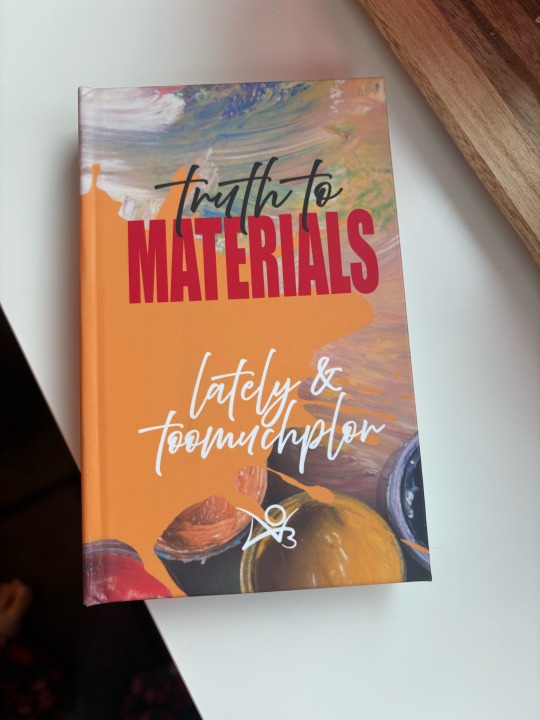
I have a colour printer now. Can you tell? Lol.
This is, of course, a bind of my own co-authored fic with lately, who is not on Tumblr much/at all, and not under that name. (Apparently I continue to have the idea that I must try out new techniques on my own work first?)
The fic features artist Draco, so I went with that theme for the book design. I also used Canva for the first time, which was a mix of frustration (“whyyyy doesn’t it do this thing Illustrator does???”) and joy (so! much! stock! art!!!) I actually wound up banging the cover doc back into Illustrator because I didn’t trust the lack of guides and dimensions for measuring the cover, but the export was fairly seamless, so that was fine.
Back cover blurbs feat. @moonflower-rose because their comment made me lol so much when I went digging for gold in the comments. Also @thehoneybeet! (I feel weird putting my own reviews on the cover but I’m pretending they’re all directed at lately.)
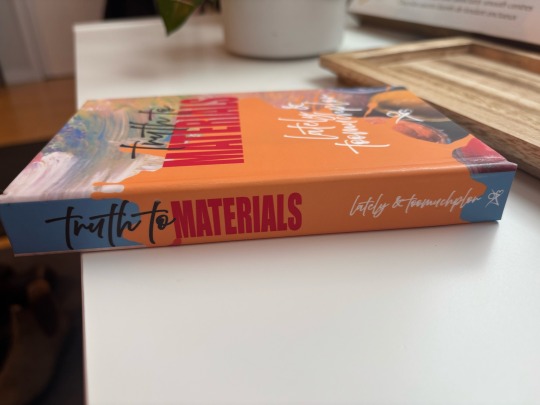
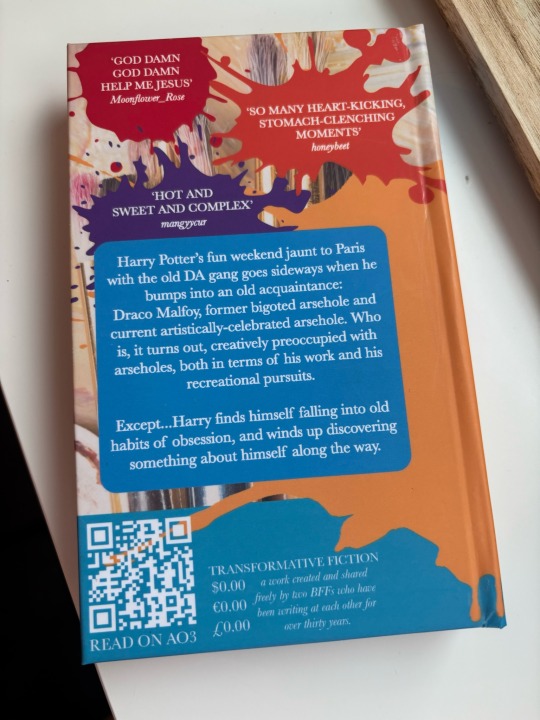
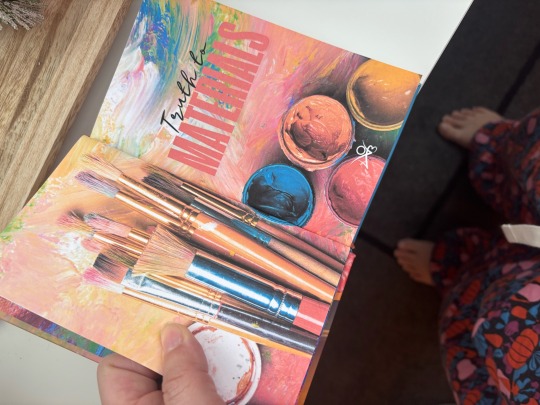
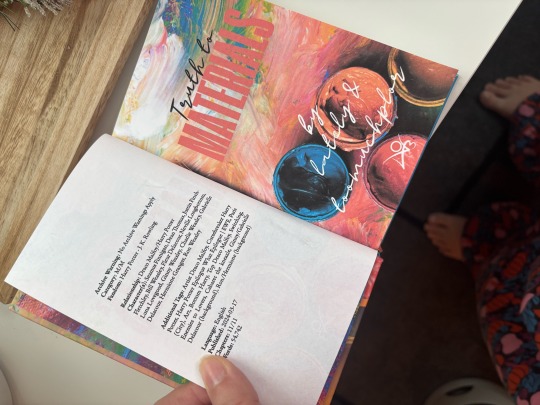
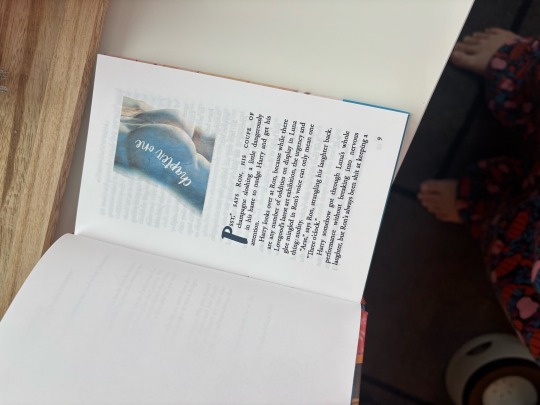
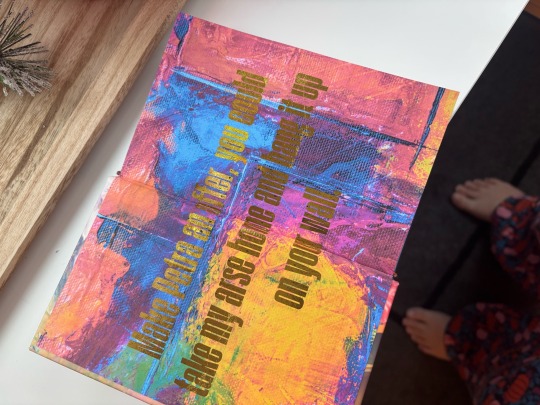
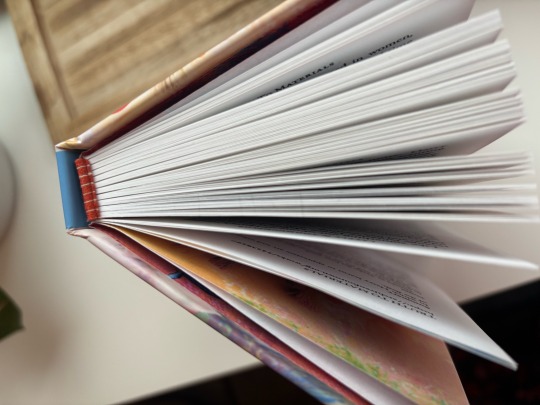
More blathering under the cut.
For the wrap cover: glossy legal photo paper laminated in a matte legal 3mil pouch — two covers back to back so only the front gets laminated. I actually tried this first on plain paper but the ink bled in spots from the glue moisture and the whole thing delaminated as the glue struck through. I think the glossy coating provides a better barrier between ink and glue. I also used straight PVA on the second go, reasoning that it carries less water. Seemed to work?
Ran into some troubles with hinges delaminating, though, I think more from flexing and the bone folder than moisture? I can see why the IG Dramione binding girlies use the soft touch laminate — less than half the thickness. I haven’t bought any yet though, not sure I am that keen?
The endpapers are foiled but I was annoyed with the folding obscuring the words — might have to be more cautious with that in future.
All the chapter headers are artworks pulled from the bestmuseumbum hashtag on the bird site. It was very fun finding them. (This fic started with a Louvre visit in which lately and I very maturely admired many sculpted arses so there’s a theme.)
Endbands are sewn with embroidery floss and they came out sooo shiny and neat. One strand of floss per wrap is the way to go, even though it’s slow and fine work.
The rest of the bind is unremarkable — legal quarto, sewn French links, bradel-style case.
The cover came out quite 90s which I kind of love. As I’ve said before, and at risk of dating both of us, co-author lately and I met in our young teens, and that was…in the 90s. The earlier part. So a 90s vibe cover for the first fic we managed to co-write since that time? Perfect. Saved by the Bell goodness.
So… cover wraps… I am not sure! I think it’s probably cheaper than even homemade book cloth, but I imagine the archival quality is not great with all the plastic involved. But then same with HTV. I will almost certainly do it again, especially if I want to do something like a book that’s disguised as a textbook or magazine. While I love the artwork available in Canva, I definitely felt like my own creativity was less present? Hard to describe.
One little technical problem that I’m solving: endpapers didn’t stick to the hinge insides fully, not sure if the wrapped spine is too wide or it’s a lamination not liking glue thing or… but the problem is minor. Something to troubleshoot next time.
#bookbinding#fanbinding#case binding#drarry fanbinding#drarry#hp fanbinding#truth to materials#toomuchplor
101 notes
·
View notes
Note
perhaps a bit of an odd question: so, when I'm scrolling tumblr on mobile, I have a habit of downloading most images i come across, so that I can send them to people who don't use tumblr, especially memes and animal photos. however, i also have severe memory issues, and I may end up forgetting where i got certain images. i know for the photo repository one of the rules is to not repost the photos without any modification- which i might forget, or forget which images on my phone fall under that rule. and while i would guess that that rule doesn't apply to stuff like direct messages or texts, i might forget to tell the person I'm sending it to, who might repost it elsewhere without being aware, or months after downloading i will just forget and use one of the photos in a post I'm making because it felt relevant.
this is something i can pretty easily solve myself by just blocking the photo repository blog, or tags relating to it, but I'd rather not do that because i do really like seeing the photos and all the info and stuff. and i would assume it would be an insane amount of work for you to add something like a watermark to every single photo, so I'm not really sure how to go about this. i like seeing the photos, but i don't want to accidentally break the rules.
You clearly care deeply about doing the "right thing", so, what that tells me is that you're not actually the target audience for that rule. I appreciate all the thought you put into this message. Let's talk about it!
I've been reconsidering if requiring people to get permission for reposting images is the best policy to have and I'd like people to weigh in.
My original reasoning was this: the more I can ensure that reposts are affiliated with credit, the better I can control copyright on the images on the site, and therefore have more ground to challenge any scrapers/fake accounts/AR groups that yoink them for nefarious purposes. The easiest way to do that seemed to be to have people ping and ask, with the expectation of saying yes almost all the time.
But there's a couple problems with that, I think, in practice:
People don't like emailing strangers (I forget this! I have done it for work for so many years it isn't uncomfortable anymore).
This isn't how the internet works. (Tumblr has a specific microculture that encourages crediting creators and not stealing! Once this is shared more widely on other platforms, I don't expect it'll be the same ecosystem).
It actually undermines organic spread of content! (You're less likely to make an excited post about a cool photo if you have to send a maybe-scary email and wait for a response). And I do want there to be lots of eyeballs on the photos.
Realistically, @nexus-nebulae, with the policy right now? If you slipped up and reposted something without thinking, I'd just ask you to add credit to the post so it directs back to the site. The goal of this whole project is community access and engagement - I want to you to enjoy the photos, and send them to your friends! I'm just trying to also protect it from the awful that a lot of the internet has become.
But, I'm also wondering it it makes sense to swap the policy to say that it's fine to re-post images on socials as long as they're appropriately credited and/or linked back to the repository. This isn't the policy yet, but if you're reading this please tell me what you're thinking.
Non-edited image use (like putting them in a scientific paper, using them to build a curriculum unit, or putting them on board game cards - these are just random examples) would still need to be requested; but that's an entirely protective stance and if you ask, my goal is to always say yes.
So OP, please don't worry too much. Enjoy looking at the animals, do your best, and I'll be happy. :)
88 notes
·
View notes
Text
A Retrospective on Harry Potter
Why did I like it in the first place? What about it worked? Where do I go from here?
I have decided to give up Harry Potter.
J.K. Rowling’s reputation now stinks to high heaven. At this point, she is quite indefensible. And even if that weren’t the case, she is not someone that I would want to associate with anyway. Meanwhile, the internet has not only turned against her, but against Harry Potter itself. An innocent question on Reddit, about which Hogwarts Houses the ATLA characters would be in, got downvoted to oblivion. Innumerable Tumblr threads insist that fantasy fans should get into literally anything else (suggestions include Discworld, Earthsea, The Wheel of Time, and Percy Jackson). And now that Harry Potter is no longer a sacred cow, there has been a recent slew of video essays that rip it to shreds, attacking it for its poor worldbuilding, unoriginality, and the problematic ideas baked into the original books (like the whole SPEW thing), etc. Those criticisms always existed, but now they’re getting thrown into the limelight.
It pains me to see such an ignoble downfall of Harry Potter’s reputation. If Rowling had just kept her damn mouth shut, Harry Potter would have aged gracefully, becoming a beloved children’s classic. I'd still plan to introduce it to my own kids one day (after Rowling dies and the dust settles). It’s not surprising that not all aspects of it have aged well, since it’s been more than twenty years since its original publishing date, and everything starts to show its age after that long. I acknowledge that most of the criticisms of the series that I’ve seen lately are valid, and I’ve read plenty of better books. And yet, when I return to the books themselves, even with the knowledge of who JKR really is inside my head, I still really enjoy reading them! There’s still a lot about them that I think works!
None of the other things I’ve read have had as collossal of an impact upon my identity, my values, and my own writing as Harry Potter. It’s hard to move on from it, not just because it’s something I enjoy, but because I have to literally extract my identity from it. I don’t know who I’d be without Harry Potter. I don’t know what my work would look like without Harry Potter. I don’t know how to carry it with me as just another piece of media that I like, as opposed to a filter for who I am as a person. So, with all that in mind, I have to ask myself why I liked Harry Potter so much in the first place. If I’m going to move on from it, then I have to be able to define and isolate the things about it that I want to keep with me. Something about it obviously worked, on a massive scale. So what was it?
It’s not the worldbuilding. The worldbuilding is objectively quite terrible, especially in comparison to that of other fantasy writers who knew what they were doing. At best, it’s inconsistent and poorly thought-out, and at worst it’s insensitive or even racist. Is it the characters? The characters are, in my opinion, one of the stronger parts of the story. But I felt very called-out by one of the many online commentators, who said that anyone who identifies with Harry is too cowardly to write self-insert fic. (I do not remember who said it or even which site it was on, but I distinctly remember the phrase, “Reject Harry Potter, embrace Y/N.”) The reason why people get so invested in Harry Potter’s characters is because they’re easy to project upon, and it’s possible that my love of Harry comes more from over a decade’s worth of projection than anything else. The incessant arguments over characters like Snape, Dumbledore, and James Potter ultimately stem from the fact that these characters do not always come across the way Rowling wanted them to. As for the writing itself, it’s decent, but not spectacular. Harry Potter is something of a sandbox world, with less substance than it appears to have and a crapton of missed opportunities, making it ripe for fanfic. For more than ten years, I’ve been doing precisely that — using Harry Potter as a jumping-off point to fill in the gaps and develop my own ideas, some of which became my original projects.
So what does Harry Potter actually have that sets it apart? Why are people so desperate to be part of Harry Potter’s world if the worldbuilding is bad? What, specifically, is so compelling about it? I think that there’s one answer, one thing that is at the center of Potter-mania, and that has been the underlying drive of my love of it for the past decade and a half: the vibe.
Harry Potter’s vibe is immaculate.
You know what I mean, right? It’s not actually a product of any specific trope, but rather a series of aesthetic elements: The wizarding school in a grand castle, with its pointed windows and torches and suits of armor, ghosts and talking portraits and moving staircases, its Great Hall with floating candles and a ceiling that looks like the night sky, its hundreds of magically-concealed secret doorways. Dumbledore’s Office, behind the gryphon statue, with armillary spheres in every single shot. Deliberate archaisms that evoke the Middle Ages without going as far as a Ren Faire: characters wearing heavy robes, writing with quills and ink on parchment instead of paper, drinking from goblets, decorating with tapestries. Owls, cats, toads. Cauldrons simmering in a dungeon laboratory. Shelves piled with dusty tomes, scrolls, glass vials, crystal balls, hourglasses. Magical candy shaped like insects and amphibians. A library with a restricted section. A forbidden forest full of unicorns and werewolves. That is the Vibe.

There are five armillary spheres just in this shot. They are unequivocally the most Wizard of tabletop decor.
There’s more to it than just the aesthetic, though. The vibe is present in something that writers call soft worldbuilding.
There’s a phrase that writers use to describe magic systems, coined by Brandon Sanderson: hard magic and soft magic. Sanderson’s first law of magic is, “An author’s ability to solve problems with magic is directly proportional to how well the reader understands said magic.” A hard magic system has clearly-defined rules — you know where magic comes from, how it works and under which conditions, how the characters can use it, and what its limitations are. Examples of really good hard magic systems include Avatar: The Last Airbender and Fullmetal Alchemist. If the audience doesn’t understand the conditions under which magic can work, then using magic to get out of any kind of scrape risks feeling like the writer pulled something out of their ass. It begs the question, “Well, if they could do that, then why didn’t they do that before?”
You may come away from that thinking that having clearly-defined rules is always better worldbuilding than not having them, but this isn’t the case. Soft magic isn’t fully explained to the audience, but that doesn’t matter, because it isn’t trying to solve problems — its purpose is to be evocative. Soft magic enhances the atmosphere of a world by creating a sense of wonder. If your everyman protagonist is constantly running into cool magical shit that they don’t understand, then the world feels like it teems with magic, magic that is greater and more powerful than they know, leaving lots of secrets to uncover. Harry Potter, at least in the early books, excels at this. The soft magic in Harry Potter is what got me hooked, and I think it’s what a lot of other people liked about it, too.
The essence of soft magic is best summed up by this scene in the fourth film, in which Harry enters the Weasleys’ tiny tent at the Quidditch World Cup, only to find that it’s much bigger on the inside. His reaction is to smile and say, “I love magic.”

That’s it. That’s the essence of it. You don’t need to know the exact spell that makes the tent bigger on the inside. You don’t need to know how Dumbledore can make the food appear on the table with a flick of a wand, or how he can make a bunch of poofy sleeping bags appear with another flick. You don’t need to know how and why the portraits or wizard cards move. You don’t need to know how wizards can appear and disappear on a whim, or what the Deluminator is, or where the Sword of Gryffindor came from. You don’t need to know how the Room of Requirement works. Knowing these things defeats the purpose. It kills the vibe, that vibe being that there is a large and wondrous magical world around you that will always have more to discover.
One of the best “soft magic” moments in the books comes early in Philosopher’s Stone, when Harry is trying to navigate Hogwarts for the first time:
There were a hundred and forty-two staircases at Hogwarts: wide, sweeping ones; narrow, rickety ones; some that led somewhere different on a Friday; some with a vanishing step halfway up that you had to remember to jump. Then there were doors that wouldn't open unless you asked politely, or tickled them in exactly the right place, and doors that weren't really doors at all, but solid walls just pretending. It was also very hard to remember where anything was, because it all seemed to move around a lot. The people in the portraits kept going to visit each other, and Harry was sure the coats of armor could walk. —Philosopher’s Stone, Chapter 8
Many of these details don’t come back later in the series, which is a shame, because this one paragraph is super evocative! It establishes Hogwarts as an inherently magical place, in which the very architecture doesn’t conform to normal rules. Hogwarts seems like it would be exciting to explore (assuming you weren’t late for class), and it gets even better when you learn about all the secret rooms and passages. The games capitalized on this by building all the secret rooms behind bookcases, mirrors, illusory walls, etc. into the game world, and rewarding you for finding them. The utter fascination that produces is hard to overstate.
Another one of the most evocative moments in the first book is when Harry sees Diagon Alley for the first time, after passing through the magically sealed brick wall (the mechanics of which, again, are never explained). This is your first proper glimpse at the wizarding world and what it has to offer:
Harry wished he had about eight more eyes. He turned his head in every direction as they walked up the street, trying to look at everything at once: the shops, the things outside them, the people doing their shopping. A plump woman outside an Apothecary was shaking her head as they passed, saying, “Dragon liver, seventeen Sickles an ounce, they're mad....” A low, soft hooting came from a dark shop with a sign saying Eeylops Owl Emporium — Tawny, Screech, Barn, Brown, and Snowy. Several boys of about Harry's age had their noses pressed against a window with broomsticks in it. "Look," Harry heard one of them say, "the new Nimbus Two Thousand — fastest ever —" There were shops selling robes, shops selling telescopes and strange silver instruments Harry had never seen before, windows stacked with barrels of bat spleens and eels' eyes, tottering piles of spell books, quills, and rolls of parchment, potion bottles, globes of the moon.... —Philosopher’s Stone, Chapter 5
What works so well here is the magical weirdness of wizardishness juxtaposed against normalcy. Eeylops Owl Emporium is just a pet shop to wizards. A woman makes a very mundane complaint about the price of goods, but the goods happen to be dragon liver. Broomsticks are treated like cars. All of these small moments contribute to the feeling of the wizarding world being alive, inhabited, and also magical. It gets you to ask the question of what your life would be like if you were a wizard. What do wizards wear? What do they eat? What do they haggle over and complain about? What do they do for fun?
In Book 3, Harry enjoys Diagon Alley for a few weeks when he suddenly has free time, and we get to experience the wizarding world in a state of “normalcy,” when he isn’t trying to save the world. He gets free ice creams from Florean Fortescue, gazes longingly at the Firebolt, and engages with delightfully weird people. He’s a wizard, living a (briefly) normal wizard life among other wizards in wizard-land. And that is fun. It’s so fun, that people want that experience for themselves, enough for there to be several theme parks and other immersive experiences dedicated to recreating the world of Harry Potter.

One of the greatest things about Universal was its phenomenal attention to detail. You can hear Moaning Myrtle’s voice in the women’s bathroom, and only the women’s bathroom. The walls of the Three Broomsticks have shadows of a broom sweeping by itself and an owl flying projected against the wall, so convincingly that you’ll do a double take when you see it. Knockturn Alley is down a little secret tunnel off of the main street, and that’s where you have to go to buy Dark Arts-themed stuff. It’s really well done.
Another thing that contributes to the vibe, in my opinion, is that the wizarding world is slightly macabre. They eat candy shaped like frogs, flies, mice, and so forth, and they have gross-tasting jellybeans. In the film’s version of the Diagon Alley sequence above, there’s a random shot of a pet bat available for purchase. In the third film, when Harry is practicing the Patronus Charm with Lupin, the candles are shaped like human spines. In the first book, this is Petunia’s description of Lily’s behavior after she became a witch:
Oh, she got a letter just like that and disappeared off to that-that school, and came home every holiday with her pockets full of frog spawn, turning teacups into rats. I was the only one who saw her for what she was — a freak! —Philosopher’s Stone, Chapter 4
I remember reading this for the first time, and it just kind of made intuitive sense to me. I suppose it fits into the “eye of newt and toe of frog” association between magical people and gross things, but somehow it works. Unfortunately, this is retconned later with the knowledge that wizards can’t use magic outside school, but before that limitation gets imposed, the idea of Lily amusing herself by turning teacups into rats seems like an inherently witchy thing to do.
That association between magic and the macabre shows up elsewhere, as well. In The Owl House, Luz’s interest in gross things is one of the things that marks her as a “weirdo” in the real world. When she goes to the magical world of the Boiling Isles, weird and gross stuff is absolutely everywhere. That world’s vibe leans more towards the macabre than the whimsical, but it works because you sort of expect the gross stuff to exist alongside the concept of witches, and that they would be an intrinsic part of the world they inhabit. You don’t question it, because it’s part of the vibe.
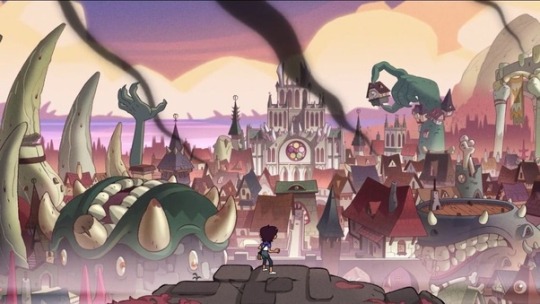
(The Owl House is one of the few things I’ve encountered that has a similar vibe to Harry Potter, but it’s still not the same vibe. In fact, The Owl House outright mocks the expectation that magical worlds be whimsical, and directly mocks Harry Potter more than once. The overall vibe is much closer to Gravity Falls.)
The Harry Potter films utilize a lot of similar soft worldbuilding with the background details, especially in the early films that were still brightly-colored and whimsical. For example, the scene in Flourish and Blotts in the second film has impossibly-stacked piles of books and old-timey looking signs describing their subjects, which include things like “Celestial Studies” and “Unicorns.” When Harry arrives in the Burrow in the same film, one of the first things he sees is dishes washing themselves and knitting needles working by themselves, taking completely mundane things and instantly establishing them as magical. In that Patronus scene with Harry and Lupin, the spine-candles and a bunch of random orbs (and the obligatory giant armillary sphere) float around in the background. One small detail that I personally appreciate is the designs on the walls above the teacher’s table in the Great Hall, which are from an alchemical manuscript called the Ripley Scroll:

It’s all these little things that add up to produce The Vibe.
Obviously, much of the vibe is expressed very well in John Williams’ score for the first three Harry Potter films. The mystical minor key of the main theme, the tinkly glockenspiel, the strings, the rising and falling notes that mimic the fluttering of an owl, the flight of a broomstick, or the waving of a wand. That initial shot of the castle across the lake as the orchestra swells, as the children arrive at their wizarding school:

If you grew up with Harry Potter, just looking at this image gives you The Vibe. The nostalgia hit is definitely part of it, but The Vibe was already there, back when you were a child and you didn’t have nostalgia yet.
In my opinion, only Williams’ score captures this vibe — the later films, though their scores are very good, do not. But the soundtrack of the first two video games, by Jeremy Soule (the same person who did Skyrim) absolutely nails it. This, right here, is Harry Potter’s vibe, condensed and distilled:
youtube
This is why I feel invalidated by the common advice “just read another book.” I have read other books. I’ve read plenty of other books, many of which are wonderfully written and have left an impact on me. But there’s still only one Harry Potter. To date, there’s only other book that has filled me with a similarly intense longing for a fictional place, and that is The Night Circus by Erin Morgenstern. That book deliberately prioritized atmosphere over everything else in the story, and actually lampshades this in-universe. The Night Circus has a plot and it has characters, but it’s not about its plot or characters. It’s about the setting and its atmosphere. It swallows you up and transports you to a fictional place that is so evocative and so magical that you just have to be part of it or you’ll die. And even then, The Night Circus has a different kind of vibe from Harry Potter. In this particular capacity, there’s nothing else like Harry Potter.
The thing is, I don’t think Rowling was being as deliberate as Erin Morgenstern. (In fact, given many of Rowling’s recent statements, I question how many of her creative choices were deliberated at all.) She was throwing random magical stuff into the background without thinking too hard about it, which works when you’re writing a kids’ story, but stops working when you try to age it up. Actually, scratch that — soft worldbuilding is definitely not just for kids! The Lord of the Rings has a soft magic system, for crying out loud, and Tolkien is the original archmage of worldbuilding. Don’t listen to anyone who tells you that prioritizing atmosphere over meticulousness is bad worldbuilding. That is a valid way to worldbuild! Not everything needs to be clearly explained, not everything needs to make sense. The problem is that Harry Potter doesn’t balance it well. Certain things do have to be explained in order for the magic to play an active role in the story (and the setting of a magic school lends itself to that kind of explanation), but no rules are ever established for the kinds of magic that need rules. When you begin thinking about the rules, you’re no longer just enjoying the magic for what it is. At worst, you begin running up against the Willing Suspension of Disbelief.
It wasn’t actually the “aging up” of the story that did it in, per se, but rather, the introduction of realism. The early books were heavily stylized, and the later books were less so. A heavily stylized story can more easily maintain the Willing Suspension of Disbelief. That’s why, for example, you don’t ask why the characters are singing in a musical — you just sort of accept the story’s outlandish internal logic, and the inherent melodrama of it doesn’t take you out of the story. Stylized stories are more concerned with being emotionally consistent over being logically consistent. The later Harry Potter books changed their emotional tone, but without changing the worldbuilding style to compensate.
In addition to the more mature themes and darker tone, Harry Potter introduced more realism as it went, but Rowling did not have the worldbuilding chops to pull this off. There’s the basic magic system stuff: When you begin thinking about it too hard, something like a Time-Turner stops being a fun magical device, and starts threatening to break the entire story. Then there’s the characters: Dumbledore leaving Harry on the Dursleys’ doorstep in the first book is an age-old fairy tale trope that goes unquestioned, but with the introduction of realism in the later books, it suddenly becomes abandonment of a child to an abusive family. The exaggerated stereotypes of characters like the Dursleys become tone-deaf. The fun school rivalry of the House system is suddenly lacking in nuance. And then there’s the shift in tone: The wizarding world that we were introduced to as a marvellous place is revealed to be dystopian. You start thinking about how impractical things like owl messengers are, you start wondering if Slytherin is being unjustly punished, the bad history appears glaringly obvious, the quaint archaisms become dangerously regressive. Oh, and the grand feasts are made through slave labor! The wizarding world suddenly feels small and backward instead of grand and marvellous. J.K. Rowling’s bigotry throws it all into an even harsher light.
This is why I’ve always preferred the early books and films to the later ones. There’s a lot of things I like about the later ones, but they’re not as stylized — they don’t have The Vibe. Thinking about things too hard is just a necessary condition of adulthood, but it’s still possible to tell a dark, mature story that is highly stylized. I really think JKR could have better pulled off that shift if she was a more competent worldbuilder. But it is painfully obvious that she did not think things through, and probably didn’t understand why she had to. In her defense, she did not know that her story would end up being one of the most scrutinized of all time. As it stands, her strength in worldbuilding was in the softer, smaller, deliberately unexplained moments of magic that were there just to provide atmosphere. And there were less and less of those as the books went along.
Pretty much all the Harry Potter-related content released since the last film — including Cursed Child, Fantastic Beasts, Hogwarts Mystery, Hogwarts Legacy, Magic Awakened, and that short-lived Pokemon Go thing — have been unsuccessful attempts at recreating The Vibe. In fact, the only piece of supplemental Potter content that I think had that Vibe down pat was the original Pottermore, back when it was more of an interactive game. And of course that got axed. That was right around the time things started going downhill.

Some of the art from Pottermore’s original Sorting quiz.
So what now? Well, that’s the question.
I think I can safely say that The Vibe was the reason I liked Harry Potter. It’s the thing I still like the most about it. I’ve spent years chasing it, like an elusive Patronus through a dark wood. If I can capture and distill that Vibe, and use drops of it in my own work, then perhaps I won’t need Harry Potter anymore.
I'm gonna write the story that I wish Harry Potter was, and when I'm a famous author, I won't become a bigot. I'll see you on the other side.
#harry potter#harry potter fandom#harry potter analysis#j.k. rowling#jk rowling#anti jkr#fuck jkr#screw jkr#anti jk rowling#fuck jk rowling#writing#worldbuilding#soft worldbuilding#soft magic#magic system#fantasy worldbuilding#fantasy writing#moving on from harry potter#moving past harry potter#long post#wizard#hogwarts school of witchcraft and wizardry#wizarding world#vibes#analysis#Youtube
151 notes
·
View notes
Text
Hands

Pairing: No-Outbreak!AU, Joel x Teacher!Reader as usual (let's just assume these No-Outbreak Joels are all the same couple tbh), established relationship
Summary: Friday nights are reserved for sweatpants and relaxation, of course. But when Joel's work week leaves his hands a bit worse for wear, the night may need to include a break for a little extra attention.
Warnings: extreme fluff once again. expect it at this point. i'm a one-trick pony, i fear.
A/N: finally got around to putting one of my many bulleted notes-app idea fics into paragraph form again! Will we get another one before the year's out? It's anyone's guess! -_-
——————
Friday nights are your favorites. No dinner to cook or rattling rolodex of tasks to come in the next twelve hours give you both a little room to breathe — to gently unwind from yourselves and into one another. It’s typically quiet, and when it isn’t, the volume is born of laughter from games or stories the three of you share.
Joel comes home from an exceptionally long week. You know he’s been on site every day—the whole team has—working longer and longer hours to wrap up the latest project before the client’s deadline. You’re pleased to hear his keys rattle in the door not long after five o’clock, and relieved because the air’s rapidly cooling earlier each night. Daylight Savings time is coming to an end, and today he barely beat the sunset getting home.
You know the hour means little, however, and are less than astonished at the weary grin he bears on catching sight of you and Sarah on the couch when he walks in the room. She’s already got her purse on her shoulder, eager to head out when her friends arrive, and she’s excitedly recounting the events of the trailer for the movie they’ll be catching tonight. He stands idly in the doorway for a moment, just listening to the two of you chat. You make brief eye contact and smile back, assuring you know he’s there. Neither of you wants to interrupt her avid storytelling.
“Well don’t you sound excited?” he says when she pauses to catch her breath. You both turn to greet him, and he moves more quickly toward you as you attempt to rise, gesturing to you to remain seated. He’ll come to you both.
He plants a kiss on top of Sarah’s head before leaning down to kiss you as he does each night. You place a hand on his chest and pause when he pulls back to get a good look at his face. You see the fatigue in his droopy-eyed smile, but can’t say anything to him. You already know it’s mirrored in your own expression.
The doorbell rings before either of you can speak again, and Sarah jumps up to head out the door. You wish her a good night, and he follows her to the door, checking for a familiar parent in the driver’s seat and seeing her off. You see him hand her some cash to go with his reminder to make good decisions, and he hugs her. You can’t help but giggle when she takes it with a wide smile.
He turns to you laughing when he sees she’s in the car, and shuts the door.
“What?” he asks, brow furrowed in confusion, but amused at the sound of your laughter.
“Smart girl. I gave her a 20 before you got home,” you grin back at him. He stills in understanding and rolls his eyes.
“You couldn’t tell me that two minutes ago?” he asks you in mock exasperation.
“But it’s so much funnier this way!” you add, giggling again. You both know he’s wrapped completely around her finger, though she so innocently does not. It’s one of the first things you noticed about him. One of the first reasons you fell in love.
He shakes his head fondly, and places a hand on his stomach, which begins to grumble softly at him. You raise your eyebrows and meet his gaze. “Any thoughts on dinner?” he asks, and you grin back at him in amusement.
“Handled. Pizza’s already on the way,” you respond and he feigns relief.
“You’re brilliant.” he says, walking up and grabbing your hand on the back of the couch. You run your thumb in little circles on the back of his hand and give it a light squeeze.
“Duh. Now go get changed! It’s do-nothing time starting now,” you respond, patting the top of his hand in encouragement.
“You read my mind,” he says, leaning down for another quick peck before heading off into the bedroom to change out of his work clothes. Naturally, you’ve been in sweats for over an hour now, shedding your own outfit immediately, peeling the school day from your skin. The unspoken uniform for these Friday nights is extremely specific.
The pizza arrives before Joel can even return from the bedroom in a feat of incredible timing. You’re gathering plates and filling glasses with ice when he emerges ready for the night. He moves forward to help you grab the dinner, but you shoo him away to the couch.
“Nope, I got this. You sit,” you say, lightly shoving his chest away. You leave no room for argument. He grumbles a bit and raises his hands, backing away to the living room. You follow behind him with the pizza and plates, and return once more for the drinks before settling next to him on the couch. He sits on one end, and you sit in the middle, leaving little room between you.
You lean forward, putting pizza on one plate you pass to Joel before grabbing your own, then settle back against the cushion, both sinking in so comfortably a nearly audible sigh fills the room. The comfort in this relief is palpable, and the decompressing can begin. You grab the remote and put on the series you’ve been binging together recently, more for background noise than anything else.
A few slices and sitcom episodes deep, you’ve set your plates down on the coffee table. With your bellies comfortably full, you’ve somehow slumped deeper, though Joel into the couch and you into his side. His arm is draped over the back of the couch behind you, and you’re nearly laying on him, head propped against his shoulder.
You hold his free hand in both of yours and absently play with his fingers for a second when you notice the aggressive wear this week has lent his hands. They’re a raw, angry red at the knuckles; his nails are cracked in some places and peeling in others. Moving your fingers gently down toward his wrist, you focus more directly on the state of his, catching sight of a few hangnails and stretched cuticles that can’t be comfortable. He looks down as you begin to worry them beneath the soft pads of your own fingers, and you meet his gaze, brows furrowed as you look between his face and hands.
“Keep doing that, please,” he says with a sigh before closing his eyes, “I wait all day to feel your hands on mine. They’re so soft.” He lifts your hand to his lips before pressing a feather-light kiss to your knuckles. He loves the delicate, reverent way you play with his hands, like they’re small, fragile things in need of tender attention. You take his hand once again into both of yours and gently rub it between them, looking back up at him, concerned.
“How do yours feel? They look like they’re hurting you,” you gnaw a bit at your bottom lip in thought, and he tries to assuage your worry.
“I’m alright, darlin’. Nothing worse than I’m used to,” he says. He knows from your deepening frown that you’re less than satisfied with this response.
You couldn’t care less if he’s used to it, he shouldn’t be. You know the protective callouses forged there don’t mean those hands are unfeeling in the slightest.
“Wait there. I’ll be right back,” you say, rising from his side and hastening to the bedroom. It’s his turn to frown now, both in confusion and at the sudden draft that’s appeared at his side.
You return not a minute later with a small tote around your wrist, and hands filled with half the manicure items you own. You sit down next to him and unpack, laying clippers, files, cuticle oil, and two different hand creams — a lotion he’s seen you use regularly, and a jar that must be a new addition — on the coffee table in front of you, along with the selected polishes and remover you had in the tote bag. You’ve been meaning to do your nails, anyway.
Joel looks incredulously at you, unsure where this is going. Not that he’s a stranger to nail polish — he raised a little girl on his own long enough to have worn the rainbow on his fingers, but tonight?
“Sorry, no color for you today, honey. Certainly not before these are healed,” you say. He’d chip half your handiwork away by Monday afternoon anyway the way he’s been working lately. Facing him, you cross your legs on the couch and smile, holding your hand out expectantly for his. He raises his eyebrows at you, but places his palm gently in your own.
You grab the clippers and get to work on the hangnails first. Any peeling skin or cuticle right there at the nail you clip as gently as possible, making note of the reddened and slightly swollen areas at the base of his nail from which they protrude. Those will need careful attention at the end. He doesn’t squirm or react in any way, but you know they’re more sensitive than he’s letting on.
Next, you clip back any breakages and unevenness in the nails themselves. You’d never find Joel Miller with dirty hands — he gets them clean as soon as he gets home, but all the scrubbing it takes to keep them that way takes its toll. A little trim at their length might help reduce the need for so much each day upon his return.
After clipping, you grab his first hand again and rest it gently in the palm of your left while your right files steadily to even any rough edges left behind and prevent further injury. It won’t take much, but you’re sure to get them smooth so they won’t catch on anything or bother him later on.
The cuticle oil is next. He looks at it questioningly, clearly a bit skeptical, only having seen it a few times when you or Sarah used it. He’s never ventured so far himself. While you brush it gently onto each of his nails, you explain its purpose.
“This’ll just help your nails get a little stronger. It’ll get them hydrated a bit, keep ‘em from peeling so much when your hands get dry. It’s kinda crazy how much better this stuff is for your nails than even water is. Water’ll make the peeling worse, actually. Weird, huh?”
He just nods along, listening to you, content to learn something new as always. Finger by finger, you massage the oil into his nail and nail bed. After the first round you go back through to massage again, both to make sure no oily feeling is left behind, and to prolong the rapidly concluding process. He could use the attention, anyway.
Finally, you pick up the jar he identified as a new addition: a canister of a hand repair cream labeled for “Healing of dry or cracked skin.”
“Never seen that one before,” he says, reading the label, “What d’ya need this for? Your hands are never dry! I think they’ve been soft every time I’ve held 'em since the day I met ya,” he smiles at you, and you bashfully brush off the compliment.
“I don’t need it. I use the other one,” you say with finality, opening the jar and pulling the first of his hands into yours. You don’t grab a large dollop of the stuff. You don’t want him to feel a disconcerting weight, grease, or stickiness from this unfamiliar formula, so you get a little and begin. You add a bit more each time you reach a new spot on his knuckles, palms, wrists.
You take your time, gently massaging into those roughened, tender hands far more than a simple healing salve. He understands why you have the jar now, looking at you knowingly, and you smile back. No words need be exchanged.
Once you’ve finished the last finger and the last stroke on his hands, you squeeze the one in your own, then pat it gently with your other, “There. Gotta feel better now, yeah?”
Joel stares at you like he just watched you reach up and place the moon in the sky, if for no reason other than to light his path.
“Like you wouldn’t believe. Thank you sweetheart,” he says, squeezing your hand back and smiling reverently at you. You blush beneath his gaze and look away, unsure what to do with the admiration rolling off of him in waves. You lean back against the couch, file in hand as you start going at your own nails.
“Good. Don’t let 'em go that long again, either. Where they start hurtin’ ya? Maybe we oughta make this a weekly thing. Manicure night? Been needing someone to do my right hand,” you grin, wiggling the corresponding fingers at him. He smiles back at you, then reaches over and pulls you toward his side, back to your original position laying against him, head resting once again on his shoulder.
“Sounds like a plan,” he says fondly into your hair, planting a kiss to your head in the process. You get comfortable once more, foregoing any plans to do your own nails tonight. You both know those “manicure nights” will be for him — and you’ve got Sarah to do your right hand already, when you do hers.
You grab the same free hand once again and admire your work, then lace your fingers between his own, and rest your twined hands on his leg. You’re satisfied knowing the hand behind you on the couch is comfortable now, healing from the week’s toils and melting into the comforting haze of the early autumn evening.
#oops i did it again#fluff without plot#this is my only genre#I just need more SFW care directed at this man#is that so much to ask#joel miller x female reader#joel miller x f!reader#joel miller fic#joel miller fanfiction#joel miller fluff#joel miller x you#joel miller x reader#joel tlou#joel the last of us#joel x reader#tlou fanfiction#tlou hbo#joel miller imagine#no outbreak!joel miller#no outbreak au#pre outbreak!joel
315 notes
·
View notes
Note
Hi, sorry to bother you, but we spoke a few months ago about Tumblr Support’s response to seizure and eyestrain inducing ads. And while it is good to report that they’ve added a feature to report those ads, I wanted to ask for some advice
I’ve messaged staff no less than ten times about this feature not working. The same ads show up on my dash, over and over again, no matter how many times I report them. I’m up to date with my software, and still I’m put in danger by being on this site, and I can only use mobile as I do not have a desktop
Should I just quit tumblr at this point? Staff really don’t seem to care. I tried my best to give them my patience, but this has been disappointing for months now, and none of it is getting solved regardless of how much people message them. Is there anything we can actually do about it? Nobody outside our sphere is taking notice
Some of this unfortunately just has to do with the way that ads are served. Reporting the ad will get that instance of an ad removed after a certain number of reports, but depending on how that ad is served, you might be seeing the same flashing visual ten times and the ad system considers it a different ad each time (think of it like ads on a bus - you are reporting the ad on bus 249, but not the ad on bus 250 even though they are showing you the same image; sometimes the flashing image will be one campaign - so all on bus 249 - and it won't get served to you again, sometimes the flashing image will be scattered in a dozen different campaigns with different names and metadata perhaps with the explicit purpose of getting past user reports because advertising is a garbage industry full of horrible shitheads). Unfortunately I'm not sure there is anything that can be done beyond reporting the individual ads in terms of getting them removed; online advertising is generally minimally supervised by humans, which is how you end up with things like starvation-bait diet ads getting blasted all over the site with a terrible history of pro-ana networks.
Since you're using tumblr exclusively on mobile, it seems like your two other options are:
Turn off autoplay which should (in theory) stop any video (including ads) from playing in the app unless you allow it. Here's how to do that on iOS and Android.
Use the app exclusively from your mobile browser with an adblock enabled (won't work for iOS, changes the user experience pretty drastically).
There's one possible other option that I am not *recommending* I am simply stating that it is an option to explore: you could look into an adblocker like AdLock that does global video blocking on a mobile OS. The reason I'm not recommending it is that these kinds of adblockers cost money and are not known for being very reliable. It is something to investigate more if you are out of all other options
It seems likely that you've already turned off the autoplay, so that's probably not useful advice. If you haven't tried using tumblr in a mobile browser with ads blocked, that might be worth giving a shot before you give up on the app as a whole.
It's a really shitty situation and I'm sorry you're dealing with it.
262 notes
·
View notes
Note
i know that as a catholic you just have to believe with what the church says but i really dont like the belief of the original sin, i feel like its such a horrible thing to believe about yourself and about other human beings too
There are actually ways of legitimately dissenting from less essential Church teachings in a way that leaves you in good standing with the Church; I'm not sure if Original Sin is one of those things, though, to be honest.
But, anon, I'm going to offer another perspective here, starting from a quote (perhaps ironically?) from my favorite heretic. One of the things that James Carroll believes is that Original Sin has been given a bad wrap. In Constantine's Sword, he says:
I referred to Augustine’s assertion of the idea that the human condition implies a perennial state of finitude, weakness, and sin, all of which will be overcome, even for the Church, only with the end of time. [...] Augustine is thus regarded as the father of a severe, flesh-hating, sin-obsessed theology, but that dark characterization misses the point of his insight. His honest admission of the universality of human woundedness is a precondition for both self-acceptance and the forgiveness of the other, which for Augustine always involved the operation of God’s grace, God’s gift. Only humans capable of confronting the moral tragedy of existence, matched to God’s offer of repairing grace, are capable of community, and community is the antidote to human woundedness. Augustine sensed that relationship as being at the heart of God, and he saw it as being at the heart of human hope, too. This is a profoundly humane vision.
I wish I had understood the spirit of this quote when I was in high school. I remember learning in my World History class that Islam teaches that all children are born good, and then the world makes them evil. And I remember my teacher asking how that compares with Christianity, and I raised my hand and said that Christianity teaches that all of us are born evil. Because I believed that at the time. And, really, the whole framing of that question was wrong and gave really simplistic representations of what Islam and Christianity teaches, but I don't think we're alone in having internalized that understanding, anon. And that's a shame.
I thin it's important to remember the worldview that the doctrine of Original Sin is actively defending us against; there was an idea, that gets called "Pelagianism" (the poor guy it got named after may not even have believed it), that said that humans were capable of being saved on their own, by their own power. Someone on this site recently asked what people's thoughts on Pelagianism were, so you can read my thoughts here. But to keep it short and sweet, I think Original Sin is an important doctrine because it saves you from the need to be perfect.
There are ways to treat Original Sin that I think are certainly unhealthy, and I think the doctrine can be a source of anxiety and fear. But I also think, very deeply, that Original Sin should be a reason why we treat ourselves and especially our neighbor with kindness and understanding. I can look at myself and say "What I do, I do not understand. For I do not do what I want, but I do what I hate. […] For I do not do the good that I want, but I do the evil I do not want" (Romans 7:15, 19). And I can say that because I know I am ontologically wounded; that all of us have our weaknesses. That while we may still be in the moral wrong for committing a morally wrong action, our wills are compromised in a way that causes us to incline towards the comfortable and the easy rather than the good.
I wish I could go back in time and tell that class that Christianity does not teach that people are born evil. I wish I could go back and tell them that it teaches that we are born in a state of dis-integration, that we are wounded beings yearning for wholeness; alienated beings seeking everlasting belonging; beings lost in darkness, seeking the light. But I can say it now: the doctrine of Original Sin doesn't have to be an occasion to think you're depraved and without value, but it can be an invitation to come to terms with your own woundedness, because doing that (to use the words of Lutheran theologian Nancy Eiesland) "opens a space for the inflowing of grace and acceptance."
#Christianity#Catholicism#Original Sin#James Carroll#asks#Saint Augustine#Pelagianism#grace#Epistle to the Romans#sin#weakness#Lutheranism
207 notes
·
View notes
Text
The Priest (oc): Short story
(The Fungus universe)
Summary: You try and distract the Priest from a very important duty.
Tw: Yandere, oral sex, slight mentions of murder and abuse
You Can’t Leave Without a Reward.
No… you shouldn't have heard that. Yet, you did. An unintentional snoop that caused you to overhear a certain mission. One where the Entertainers would wreak havoc over an enemy site… The mere mention of such actions struck fear into your mind. The site wanted any enemy to stay weak, so this could cause so many losses… So many deaths…
This leaves you with the results of many unsure decisions. Body covered with the most unstable towel at the empty dinner table.
You were never a flirt, you had never tried to get any of their sexual attention, yet strangely enough, this was your first idea. Which to come to think of it? You were regretting it by the second. God, if you fail you are just going to look stupid and idiotic, but you had to at least try.
The entertainers worked in a group, special missions like that required the three of them. If one doesn't show up, the mission gets delayed along with a very long earful by the present members.
So you just had to hold one of them back just long enough… and the only one that felt less dreadful to choose was Henry. The Priest. He was strong-willed but… it was better than choosing Doppelganger.
Waiting around the empty room, the clock getting dangerously close to the hour. He always showed up in the dinning room before missions. For the mere fact of grabbing a drink. He would get there… At any moment… He should…
As more time passed, the sweatier you felt. The towel felt like it was crushing your lungs by the way your breath was being stolen by panic. If he didn't come… No, he will. He will-
It was like an angel had come. The door suddenly being opened to reveal the familiar older man. Bag in hand, he strolled inside before abruptly stopping. He seemed surprised by your presence and attire, his eyes only glancing at your body before diverting his gaze toward your face with haste. As if ashamed of his wandering eyes.
“My lord, didn't expect you to be here. Did no one wash your clothes?” he asked, making his way to the fridge… Grabbing himself a drink, turning back to you.
Ok, you had his attention… Now… what do you do? You didn't think so far ahead. Fuck!
“Uh, no. I had… clothes. I just thought…”
Come on, you had to think. You could say something better. You just had to think.
“I thought you… uh, deserved a reward today. Yeah”
Came out with the worst stutter you ever thought was possible. No joke, no one would ever even consider that as flirtation. Nevertheless, the man seemed moved. Curiosity displayed clearly on his features, along with a slight shade of red on his cheeks. Almost unnoticeable if you aren't paying proper attention.
“A reward? I must say I would appreciate anything you give me. Yet… for what reason may I ask?”
“Uh, because… because,” Your eyes lowered for a second, trying to come up with an answer. “Because you are extremely… helpful and you have worked hard for the people on your floor… so I want to thank you for that.”
You smiled, trying to push away any doubt in his mind, but his broken gaze towards the clock scared you. He eyed the time with slight worry before turning toward you once more. “What may the reward be?”
God, he isn’t an idiot… Why is he acting like this?
You fiddled with the towel, your fingers playfully circling the fabric. Your bust was practically on display, the towel only covering the bottom half: barely. “Just a very well-known reward… Wouldn’t you like that?”
You would think you look like a good meal. The corrupted flaunt over for ankles, so imagine your surprise when he looked away. “I’m sorry… my lord. I have something to do. Maybe when I come back-”
“What!” your anger couldn't help but show, but you quickly retracted your sentence. Eating away your own venom and swallowing it whole. “I mean why?”
“I… have something to do. I'm truly very sorry I can't indulge you in such acts at this moment”
“If you refuse you will return to nothing” the words came out suddenly and coldly. Failure wasn't allowed and if the sweat that coated your skin was any indicator, it would indicate how little options you had. “I got all prepared just for you… to turn me down?” You played the part, pouting, and everything. Observing as his resolve and will started to falter with each passing moment. Just for a little while… that's all you needed.
However, he didn't seem sure. His eyes returned to your form, tearing into your skin while debating the clock. Every single flick to the clock breaking your already hurt dignity. So, in a moment, in a mere moment, you made a decision. One that barely crossed your mind, still your body followed. You let the towel drop to the floor showing everything you had to offer. Every inch of your skin was exposed, while the bottom half of your body was hidden by the dinner table. A treat just inches away from his grasp…
….
To hell with the mission. How many times has the Doppelganger come in late for less dire reasons? Hundreds!
It was as if a light switch was flicked. Suddenly the distance between the both of you started getting smaller and smaller, each step around the table sending shivers down your spine.
“Fine, I will take your… gracious gift. My lord,” the man muttered, his voice breathless as he stood by your side. Fingers up your neck in gentle caresses while his eyes were focusing on all the wrong places. His eyes showed glee, the clock long forgotten by the way he tilted your head, trapping you in a deep kiss.
A familiar warmth invaded your mouth but you accepted the sensation. The man himself let out a sly moan before taking a moment to breathe…
“I love you. Truly” the man said, a sigh leaving his lips as if he was in a dream. “Let me just…”
“You can do anything,” you said plainly, not being able to hide the blush on your face, but Henry chuckled shaking his head. “I don't wish to do anything with my clothes off, my lord.”
Huh… peculiar.
His hands settled on your closed hips, a faint smile on his face. He gave the flesh a squeeze before gently prying your legs open for his patient gaze. He took his time eyeing every nook and cranny you so kindly bestowed upon him, yet the main event had to be done, and he was more than willing. He got down on his knees causing your mind to backtrack on everything you had ever wished for. You wished for failure and success, so the end result was never going to please you. So it only made sense the disdain building in your heart by his every touch.
In spite of the disgust you felt, you couldn't lie and say that they didn't make you feel… pretty. You felt wanted… in a way even if it only was for your body or your presence.
The way his soft hands sunk into your things before dipping his head. You felt his breath on your regions and any proper lover would look and watch their partner during such acts but you preferred to observe the clock. Anything to distract you from the wet feeling of his tongue giving your cunt some delicate attention. One hand poked at your thigh, pushing it aside while the other opened your precious flower for his ministrations.
The quiet room soon started to echo your decisions. The laps of his tongue along with the slight moans leaving you both. He acted as if eating a divine meal and you felt disgusting in a way… You weren't divine, you weren't anything special, yet he practically drooled by your mere taste.
The sensation almost made you forget the time… 25 minutes. 10 trying to convince him and the other having to sit in this humiliating position. Legs raised in order for him to indulge in his tastes, hardly taking breaks to breath air. Truly impressive, you could feel flattered…
Your body started feeling hot, resting your head against the chair as your legs tightened against his head. Practically griding your body against him in search. In search of a release, one he felt happy to give, only if the door didn't open right in the middle of it.
….
It seems the entertainers will have to reschedule such a mission. Oops.
(Since he won the pull. So here is the story;-;)
#oc#yandere#yandere story#yandere oc#yandere x darling#yandere x reader#yandere x y/n#yandere x you#ocs#yandere character#yandere smut#yandere post#yancore#yandere priest#yandere male#yandere obsession
60 notes
·
View notes